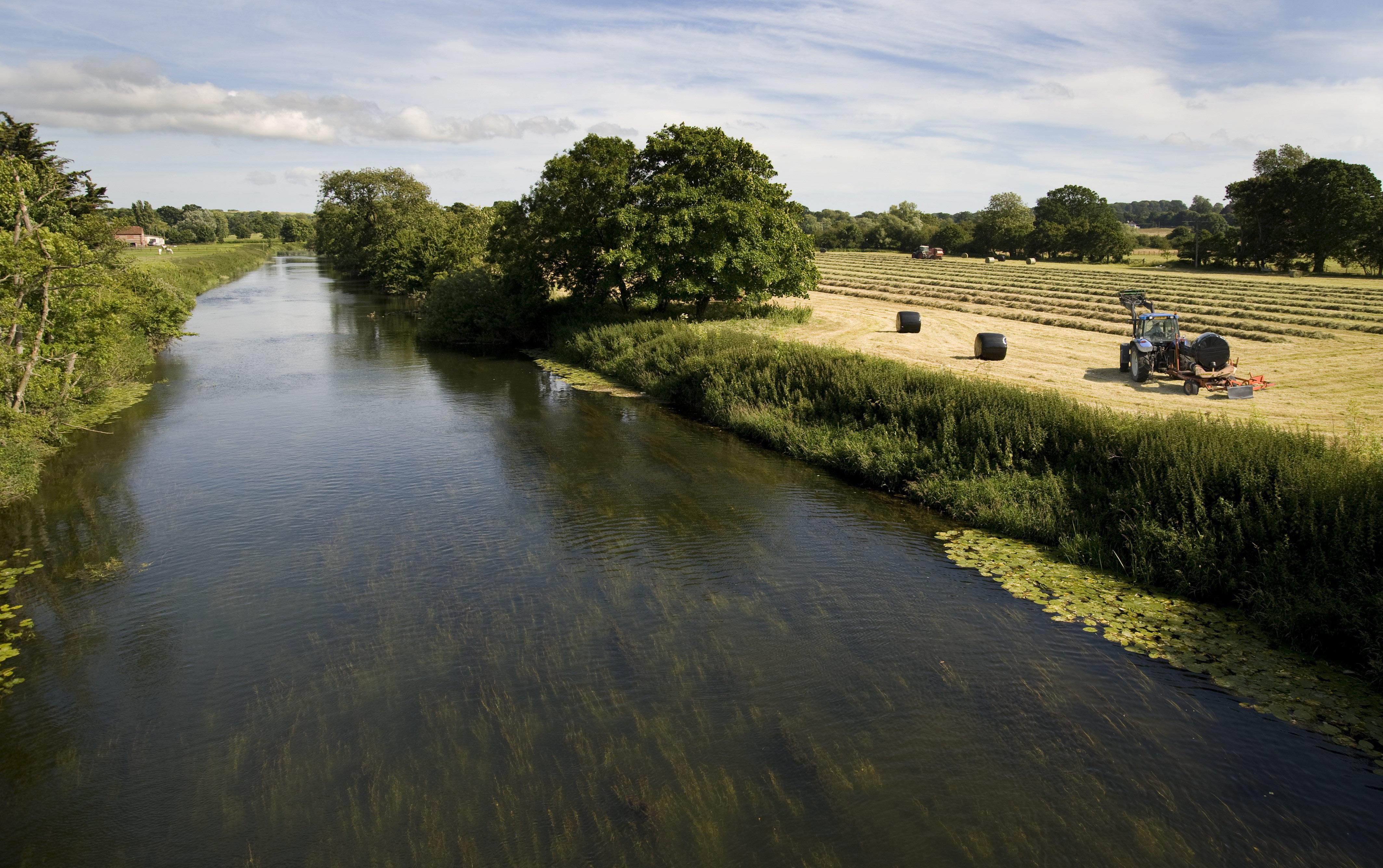

Beacons of Excellence. Sustainable Water Management. Case Studies on Best Practices.
Who are LEAF (Linking Environment And
Farming)?
We are a charity that promotes and supports more sustainable farming to create a resilient food and farming system for future generations.
We connect.
We connect farmers, innovators and industry to understand best practice sustainable farm management and how it can be applied most effectively to each farm’s unique situation.
We build trust.
We provide assurance that growers are farming more sustainably through our independently audited LEAF Marque certification; from the health of their soils to how they engage with local communities.
We
educate.
Our team of qualified educational specialists work with schools, citizens and farmers across the UK to bring sustainable farming to life, both in schools and on-farm.
What is Beacons of Excellence?
The Beacons of Excellence (BoE) programme looks to develop peer-to-peer learning and explore the benefits of regenerative agriculture and agroecology. Building on LEAF’s legacy, it will take our work to another level of knowledge generation and exchange.
Sustainable Water Management.
Water remains critical to agriculture, yet it is increasingly under pressure from climate extremes, soil degradation, and shifting resource demands. In response, our beacon farmers are leading by example—adopting innovative approaches that improve water retention, reduce runoff, restore natural cycles, and build resilience into both their landscapes and communities.
These dedicated individuals represent the best of innovative thinking and remain committed to continuous learning. Their hard work paves the way for others—demonstrating that farming alongside nature can lead to both productive, profitable, and regenerative outcomes.
Meet the farmers.
.
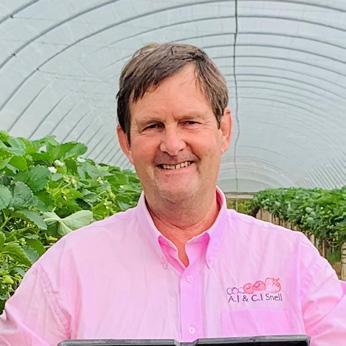



Anthony Snell
A.J & C.I Snell, Herefordshire
Andrew Court Court Farm Partnership, Gloucestershire
Nichoals
. . . . . . .
. .





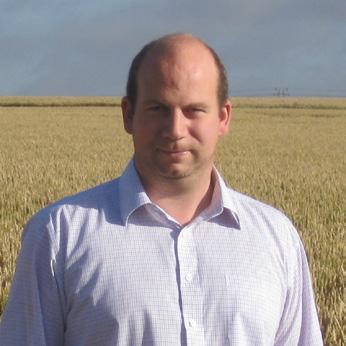
James
Tom
Dyson
NIAB
Corker UKCEH, Oxfordshire
Sandy Booth New Forest Fruit Company,
Mark Wilkinson
Hutton Institute, Dundee
Storr
Farming, Lincolnshire
Jerry Knox Cranfield University, Milton Keynes
Scott Raffle
WET Centre, Kent
Andrew Francis
Home Farm Nacton, Suffolk
Jeremy Durrant EW Davies Farms, Essex
Andrew Court. Protecting
water courses in a mixed farming system.

Court Farming Partnership, Staffordshire
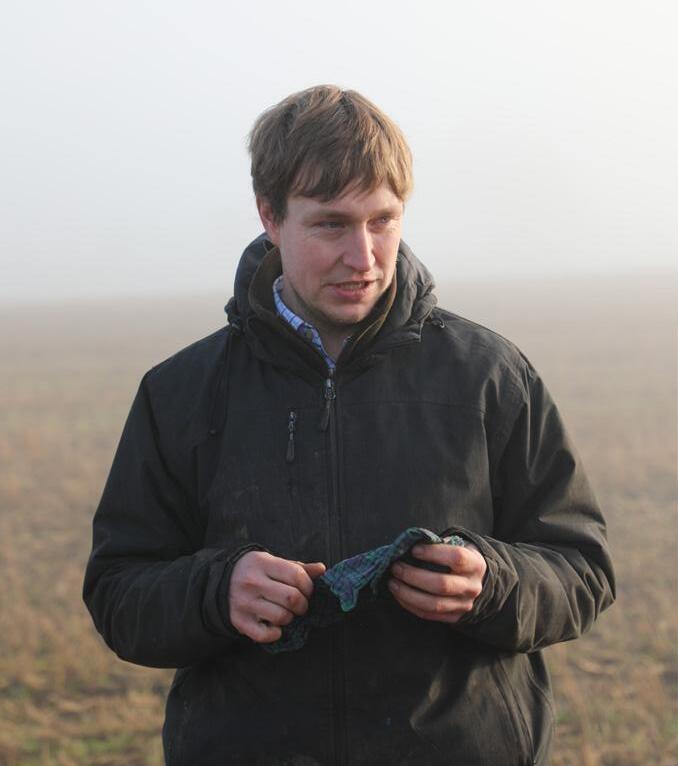

Court Farming Partnership, based in Staffordshire, is predominantly an arable based farm that also produces beef cattle for major retailers. Sustainable water management has long been a core principle for the farm, ensuring efficient crop growth and nutrient retention whilst also protecting natural water sources. Andrew has taken an innovative and forwardthinking approach to tackling water management challenges. His efforts not only benefit the farm but also serve as a valuable model for other farmers looking to adopt more sustainable practices.
Addressing water retention & nutrient loss.
The farm is situated on a light, sandy loam soil, which is highly free draining. This presents diverse challenges in retaining water during dry summers and prevention of nutrient leaching. To combat these issues, the farm has developed strategies to improve soil structure and increase its water-holding capacity, thus reducing water stress on crops and enhancing nutrient efficiency.
Key practices include:
Cover Crops:
These play a critical role in capturing excess nitrates, preventing them from leaching into groundwater. The deep-rooted systems help to improve soil porosity, which increases water retention and reduces erosion.
Paddock (Cell) Grazing:
This rotational system mimics natural grazing patterns, allowing land to recover and improving soil health by depositing nutrients naturally via faeces.
Periodic Soil Testing:
Regular analysis ensures balanced nutrient levels and informs better land management decisions. Compaction levels are also tested using a Comb Penetrometer.
A significant component of the farm’s water management success is its collaboration with Severn Trent. Being in a groundwater (GW) catchment zone, the farm takes proactive steps to prevent nutrient runoff, safeguarding water quality for the broader community.
Severn Trent supports these efforts through the Severn Trent Environmental Protection Scheme (STEPS), providing grants for infrastructure improvements. Investments in funded machinery, such as a cover crop desiccator and subsoiler, have strengthened the farm’s nitrogen use efficiency (NUE), benefitting both crop yields and water conservation.
Mark Biddulph of Severn Trent emphasises the importance of such partnerships: “For every pound we spend in a catchment, it has massive reductions in the amount of treatment work we have to do at clear water abstraction sites.”


Innovative water conservation measures.
Andrew has implemented a range of practical solutions to reduce water waste and contamination:
• Ram Water Troughs & Solar-Powered Pumps: These ensure livestock have access to clean water without damaging watercourses.
• Precision Sprayer Technology: Includes section control to prevent overlap and variable rate technology for targeted application, reducing excess usage.
• Rainwater Harvesting: Capturing pure rainwater in tanks enhances application efficiency and absorption rates for crops.
A holistic approach to water management requires constant monitoring. Andrew uses a comb penetrometer to assess soil compaction and integrates weather data into his planning. These insights ensure better decision-making, aligning with Severn Trent’s sustainability goals.

The importance of water management.
Andrew sees water management as crucial not only for environmental sustainability, but also for financial viability and social well-being.
• Financial Benefits: Effective water use minimizes wastage and prepares the farm for climate variability, from droughts to heavy rainfall.
• Community & Environmental Impact: By reducing pressure on drainage systems, the farm helps mitigate flooding risks, benefiting the wider population.
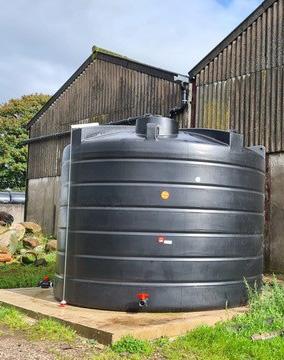
Court Farming Partnership remains committed to advancing water conservation efforts. Future goals include:
• Further expanding soil structure improvements to enhance resilience to climate change.
• Encouraging collaboration through knowledge exchange forums like the Green Farm Collective. Continuing to build on collaborative relationship with Severn Trent and other water abstraction groups, to reduce our inputs and pesticide usage to name a few.
• Exploring composting to further improve water retention and reduce waste.
Andrew’s forward-thinking approach serves as an inspiration to other farmers. His ability to combine innovation with practical, scalable solutions demonstrates that sustainable water management is not just an environmental necessity—it’s a pathway to long-term agricultural resilience. Looking to the future.
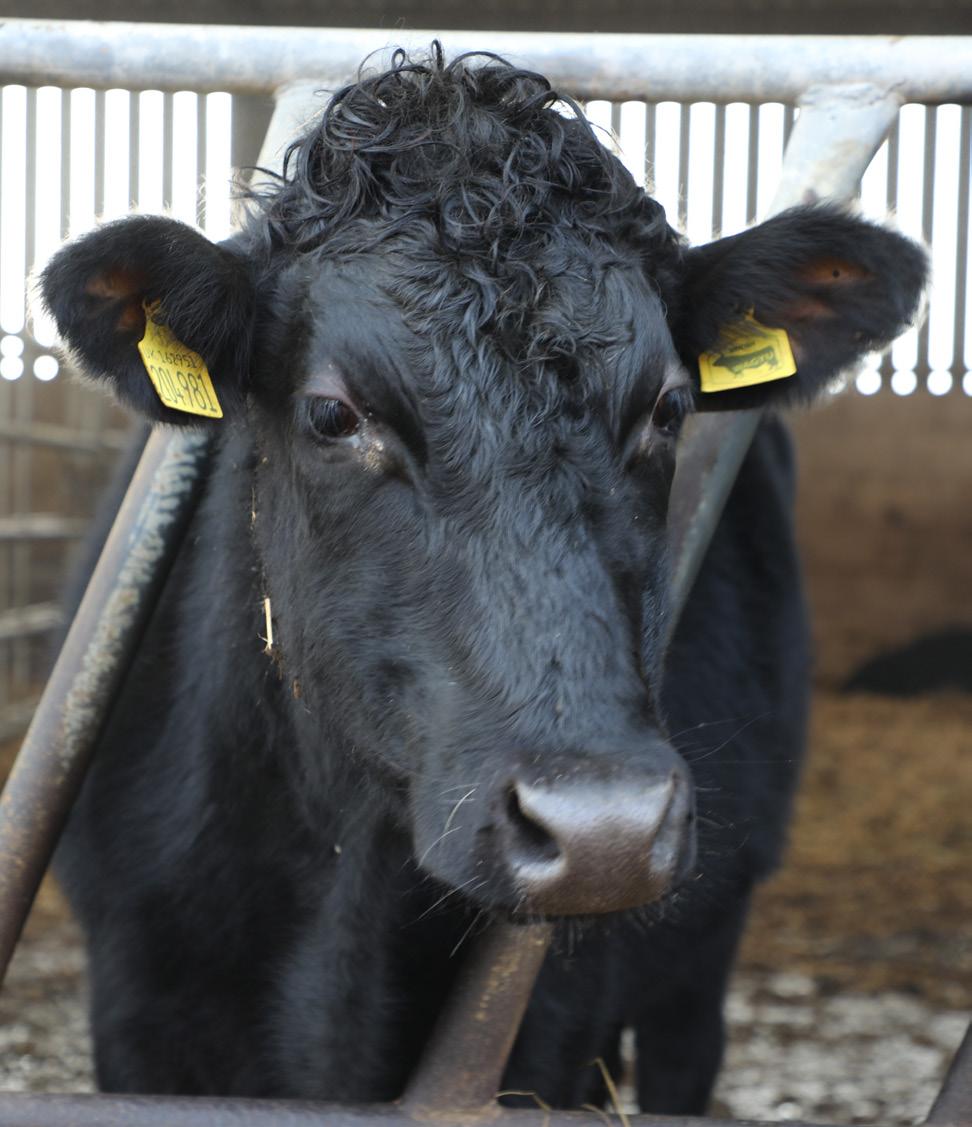
Andrew Francis. Pioneering sustainable
water management practices.

Home Farm Nacton, Suffolk

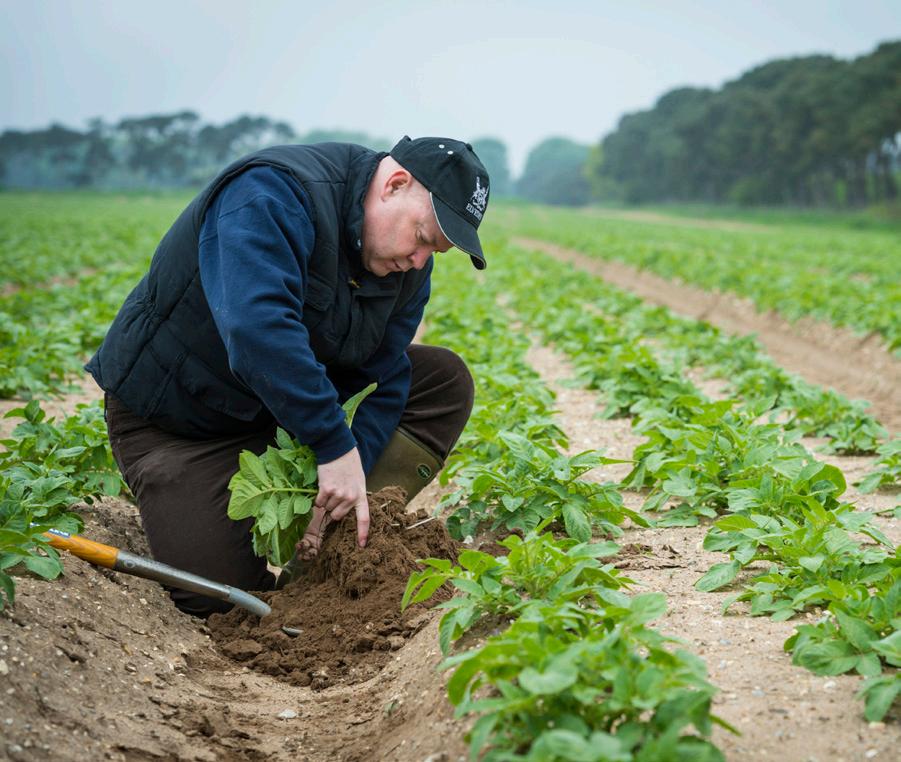
Home Farm Nacton (HFN) is a Suffolk-based farming business specialising in organic vegetables, Red Tractor certified, and LEAF Marque accredited crops. Located on 1,170 hectares of the historic Orwell Park Estate, and working with contract farms covering over 800 hectares, the business supplies major supermarkets, wholesalers, and public sales. Having always had a strong focus on sustainable farming, quality assurance, and environmental responsibility, Home Farm Nacton combines efficient, large-scale production with high professional standards.
Motivation to join Beacons of Excellence.
• HFN aims to lead by example, advocating for sustainable water practices and facilitation of knowledgesharing among farming communities alike.
• Climate change is creating unpredictable weather patterns, with periods of excessive rainfall and extreme drought. These fluctuations impact water availability, making efficient management essential.
• Community engagement is key to raising awareness about the critical role of water in agriculture, ecology, and food security.
• Exploring innovative water management solutions helps ensure long-term resilience and sustainability in food production.
“If we don’t have any water, we don’t have a business.”
– Andrew Francis.

Current practices.
• Drip Irrigation: Used for cover crops to optimise water efficiency and reduce evaporation.
• Investment in Technology:
◊ Solid-set sprinklers to enhance precision.
◊ Advanced rain gun systems with GPS mapping to reduce water wastage.
• Soil Moisture Monitoring: Capacitance probes assess soil moisture deficits, while rain measurement units track irrigation via a tipping scale system.
• Felixstowe Hydrocycle Collaboration: Regulated water abstraction from the local catchment supports sustainable distribution within the Suffolk region.
• Strategic Reservoirs: A linear chain system balances supply and demand, aiding water storage during dry and wet seasons.
• Trialling Managed Aquifer Recharge (MAR):
◊ Surplus water is directed into lagoons for groundwater recharge.
◊ Monitoring ensures water retention can support summer abstraction and river flow.
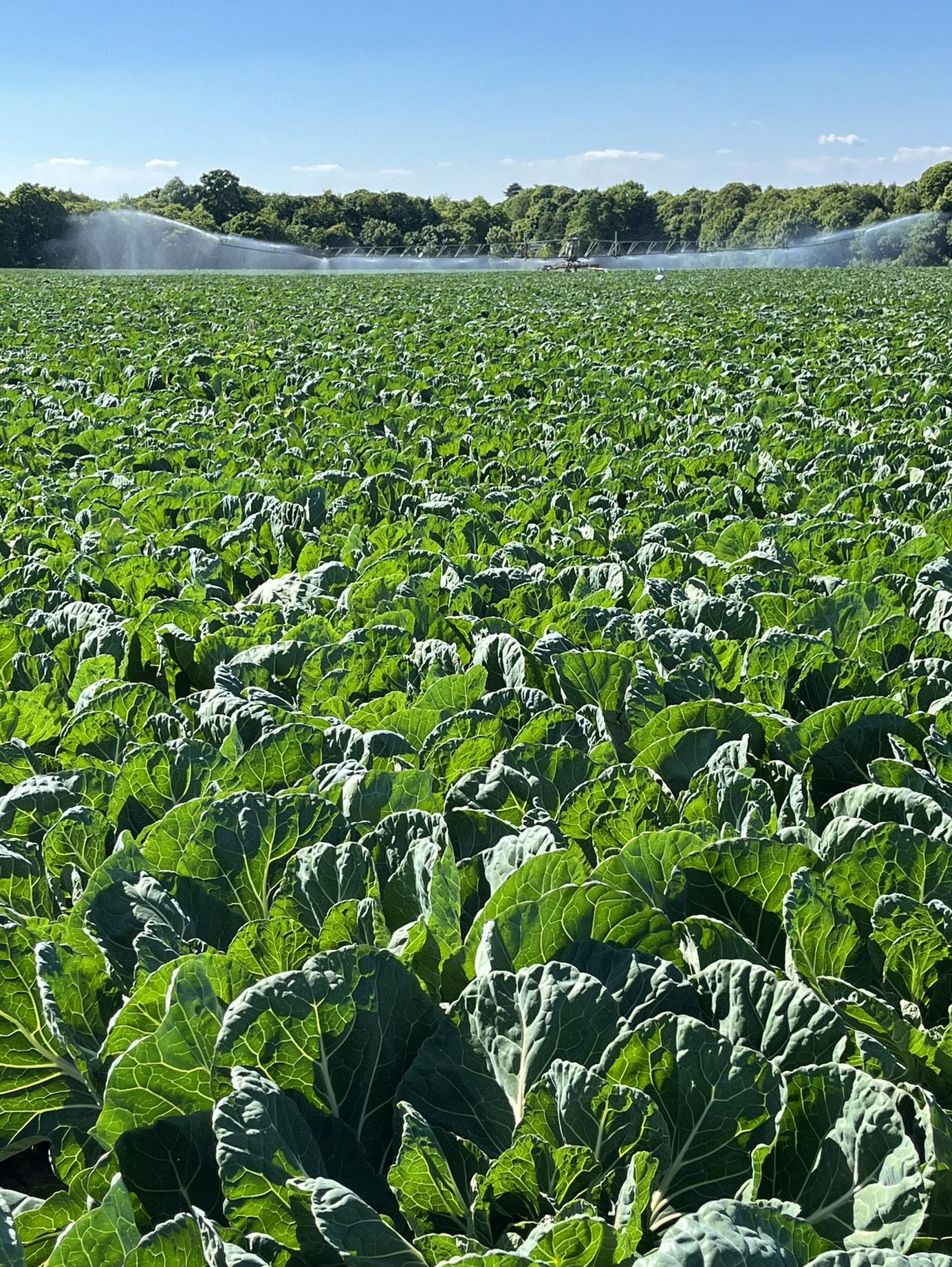
Impacts.
• Improved water efficiency through precision irrigation techniques.
• Strengthened regional water resilience via collaboration with stakeholders.
• Enhanced knowledge-sharing across the agricultural sector.
• Increased sustainability by integrating water conservation with food production.
Future planning & advice.
• A Holistic Approach: Recognising the connection between food production and ecological sustainability to develop integrated strategies that cover all aspects of sustainable water management.
• Grey Water Utilisation: Investing in infrastructure to capture and filter grey water for reuse, particularly during heavy rainfall.
• Sector-wide Collaboration: Hosting on-farm events and discussion forums to strengthen communication on water management pressures.
• Continuous Learning: Assessing past experiences to refine best practices and improve long-term water resilience. By implementing innovative technologies and fostering collaboration, Home Farm Nacton is demonstrating a proactive and sustainable approach to water management, setting an example for the future of UK agriculture.
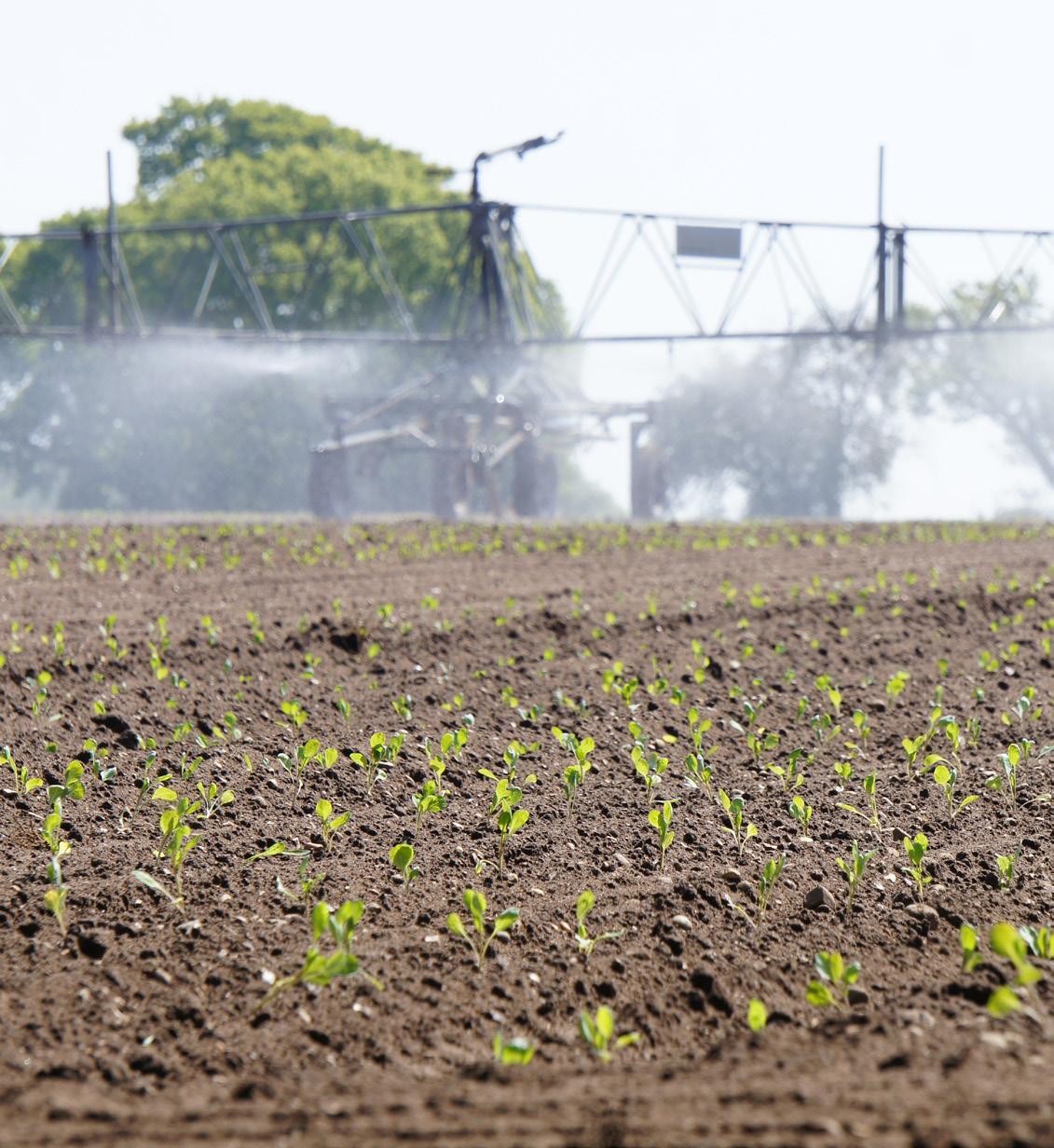


Home Farm Nacton
Anthony Snell. Sustainable
water management in the soft fruit sector.

A.J & C.I Snell, Herefordshire
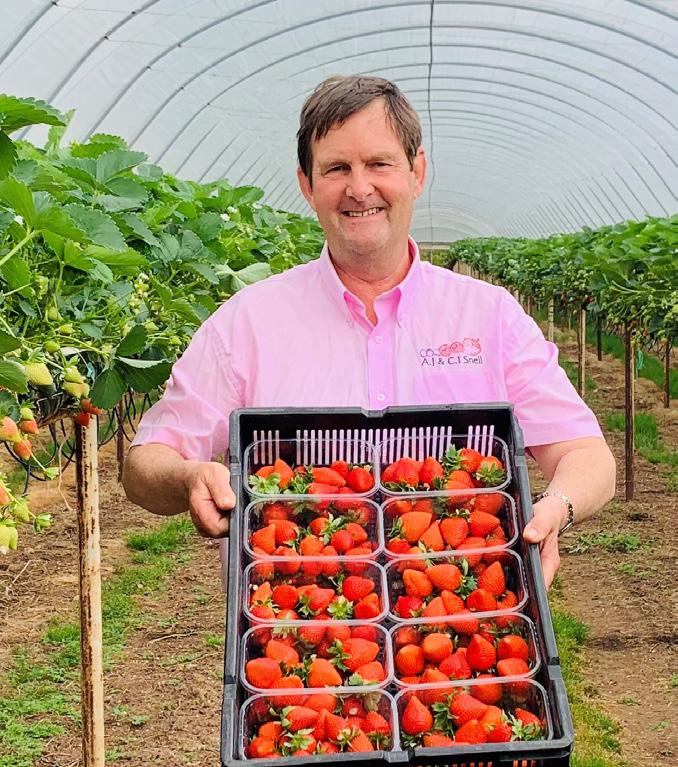
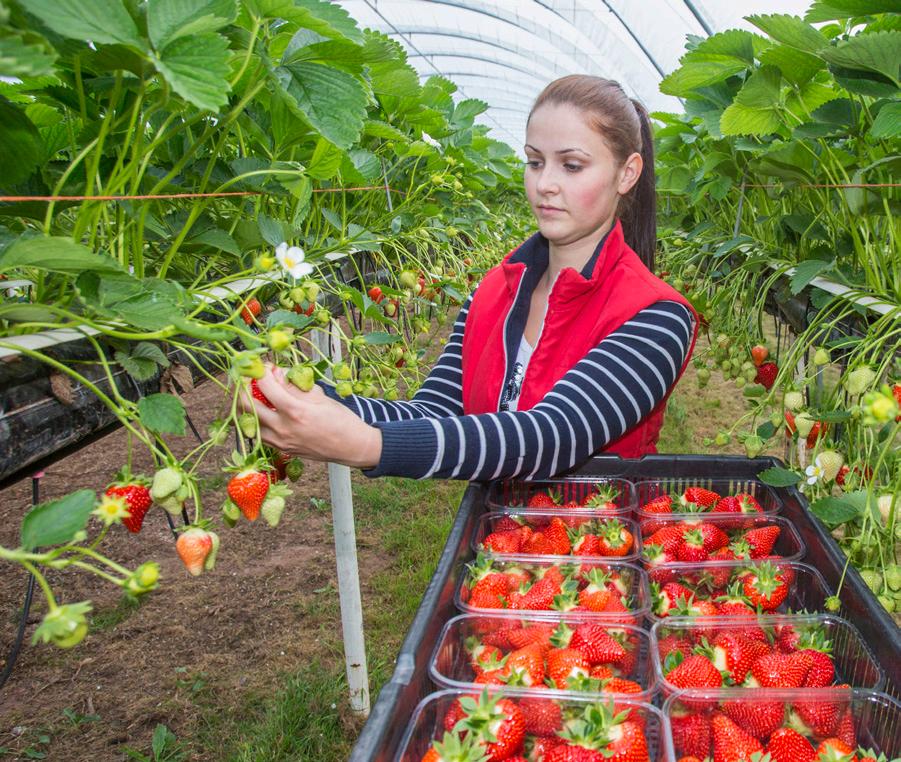
Anthony Snell is a Director of Berry Gardens and Chairman of the NFU Water Agricultural Board. His commitment to sustainable farming practices and innovation in water management made him a natural fit for BoE. Anthony’s farm was LEAF Marque certified in 2007 and became a LEAF Demonstration Farm in 2018, reflecting his dedication to sustainable and climate-positive farming.

Motivation to join Beacons of Excellence.
Sustainable water use has always been integral to A.J & C.I Snell’s farming operations. By joining BoE, Anthony aimed to further develop and share best practices for efficient water management in the soft fruit sector, ensuring long-term viability and resilience in his farming.

Current water management practices.
• On-Site Water Storage: The farm features four expansive extraction lakes that serve as the primary water source for the farm’s irrigation system. These lakes reduce dependence on external supplies and ensure a stable water source throughout the growing season, therefore minimising waste and enhancing water efficiency.
• Rainwater Harvesting: To supplement water availability, the farm has implemented a large-scale rainwater harvesting system. The farm’s 10 hectares of polytunnels are strategically designed to capture rainwater into storage reservoirs. This collected rainwater is integrated into irrigation lakes, reducing reliance on groundwater and municipal water sources.
• Use of cutting-edge irrigation technology to optimise water use. Most fruit is cultivated in substrate rather than traditional soil, allowing for more precise control over moisture levels. Advanced sensors help to continuously monitor real-time soil moisture, ensuring each plant receives the optimal amount of water without excess runoff or wastage.
• A well-structured crop rotation plan is drawn up annually to balance water consumption across different plant varieties and growing cycles. By alternating crops with varying water requirements, this prevents overextraction from specific water sources and maintains soil health.
• To safeguard against drought or unexpected interruptions in water availability, the estate maintains a 24-hour emergency water backup system. Holding tanks store reserve water that can be accessed immediately. This supports resilience against water scarcity and supports uninterrupted farm operations.
• Employees regularly participate in Integrated Farm Management (IFM) training programs, equipping them with the latest knowledge and best practices for water conservation and efficiency.
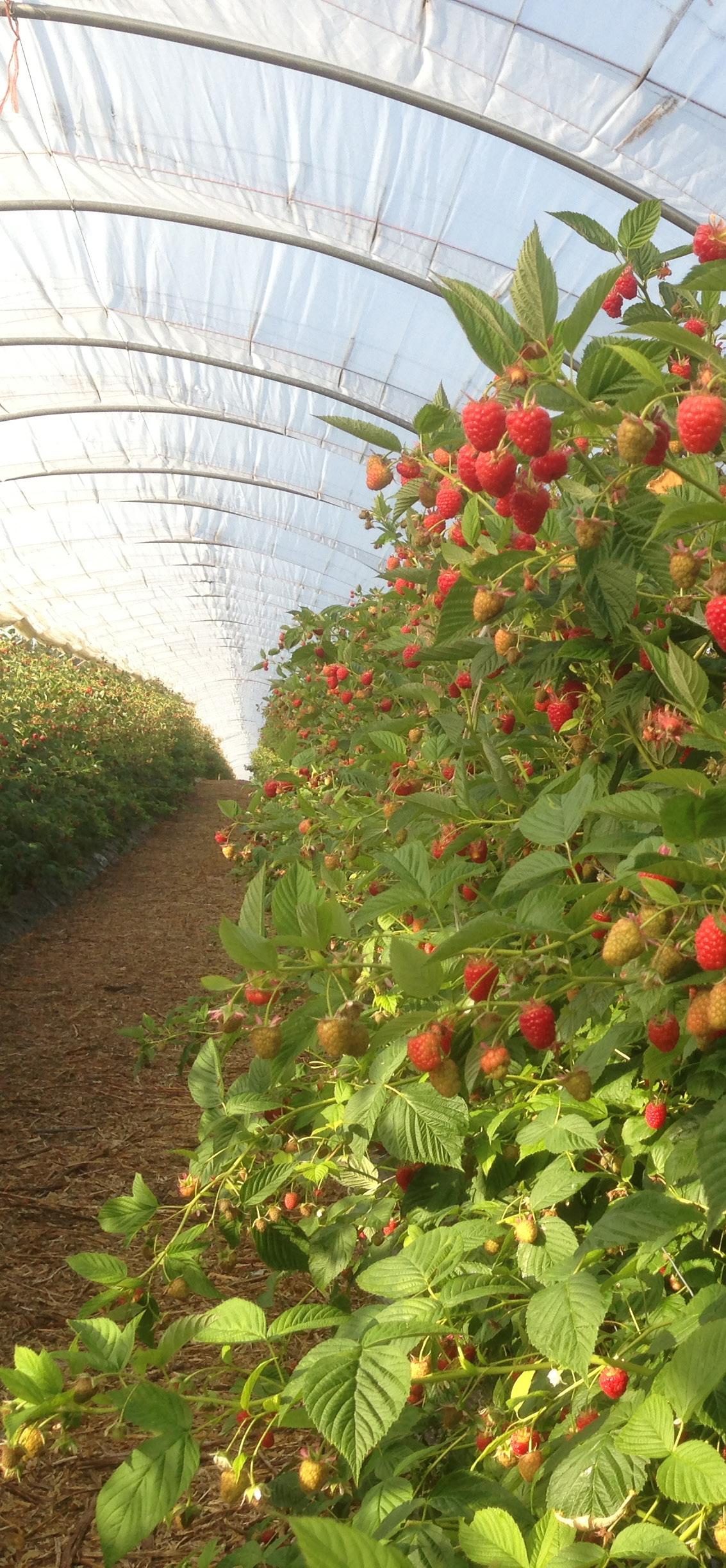
Impacts.
The farm is now 40% self-sufficient in water supply due to rainwater harvesting. The use of water meters provides live data on water extraction and usage, helping to optimise irrigation measures for a range of crop varieties. There is also a further increased resilience against water shortages, thus ensuring stable yields throughout the year and longevity of farming business.

Future planning & advice.
Expanding Water Storage: As the business continues to grow, plans for additional reservoirs and water storage facilities are underway. Future expansion and increasing capacity will remain crucial for efficient water management.
Smart Water Management Systems: Implementing more advanced water conservation techniques, including AI-driven irrigation controls, will further optimise usage and reduce waste.
Drought-Tolerant Crop
Varieties: Collaborating alongside plant suppliers to test and trial innovative drought-resistant varieties to reduce dependency on water and ensure reliable yields despite dry conditions.
Advice to farmers.
• Leverage the power of technology by using real-time monitoring systems and data to optimise irrigation efficiencies.
• Early anticipation of upcoming climate challenges and trends is vital to develop long-term solutions to sustain water conservation.
• Educate and train staff accordingly by ensuring team members understand water management strategies as stipulated by IFM principles, which is key to efficient implementation.
Through continuous commitment to more sustainable water management, Anthony Snell is setting industry benchmarks in climate-resilient fruit farming in the hope to inspire others along the way.
Jerry Knox. Advancing sustainable water management through research and innovation.

Cranfield University, Cranfield


The Centre for Water, Environment and Development (CWED) at Cranfield University is a global leader in water research, teaching, and consultancy. With a predominant focus on tackling the world’s most pressing water challenges, CWED integrates scientific, environmental, and socio-economic perspectives to drive sustainable water solutions. The centre pioneers research in catchment science, climate change adaptation, water resource management, and innovative green technologies to enhance water efficiency across across the agricultural industry.
Motivation to join Beacons of Excellence.
The farm is situated on a light, sandy loam soil, which is highly free draining. This presents diverse challenges in retaining water during dry summers and prevention of nutrient leaching. To combat these issues, the farm has developed strategies to improve soil structure and increase its waterholding capacity, thus reducing water stress on crops and enhancing nutrient efficiency.


Cranfield University
Current research and innovation.
• Drought Impact on Agriculture: Research funded by Defra and the Environment Agency is assessing how drought affects agriculture, using remote sensing to map irrigation areas and evaluating farm reservoir capacities for improved water storage solutions.
• Alternative Water Sources: Exploring innovative water sources to reduce reliance on summer abstraction while enhancing resilience to climate variability.
• Multi-Use Reservoirs with Floatovoltaics: Integrating floating solar panels on farm reservoirs to generate renewable energy, reduce carbon emissions, and lower agricultural energy costs.
• Decision-Support Tools for Farmers: Overseeing the development of advanced digital tools which help farmers to manage climatic risks, optimise irrigation strategies, and adapt to ever evolving water policies.
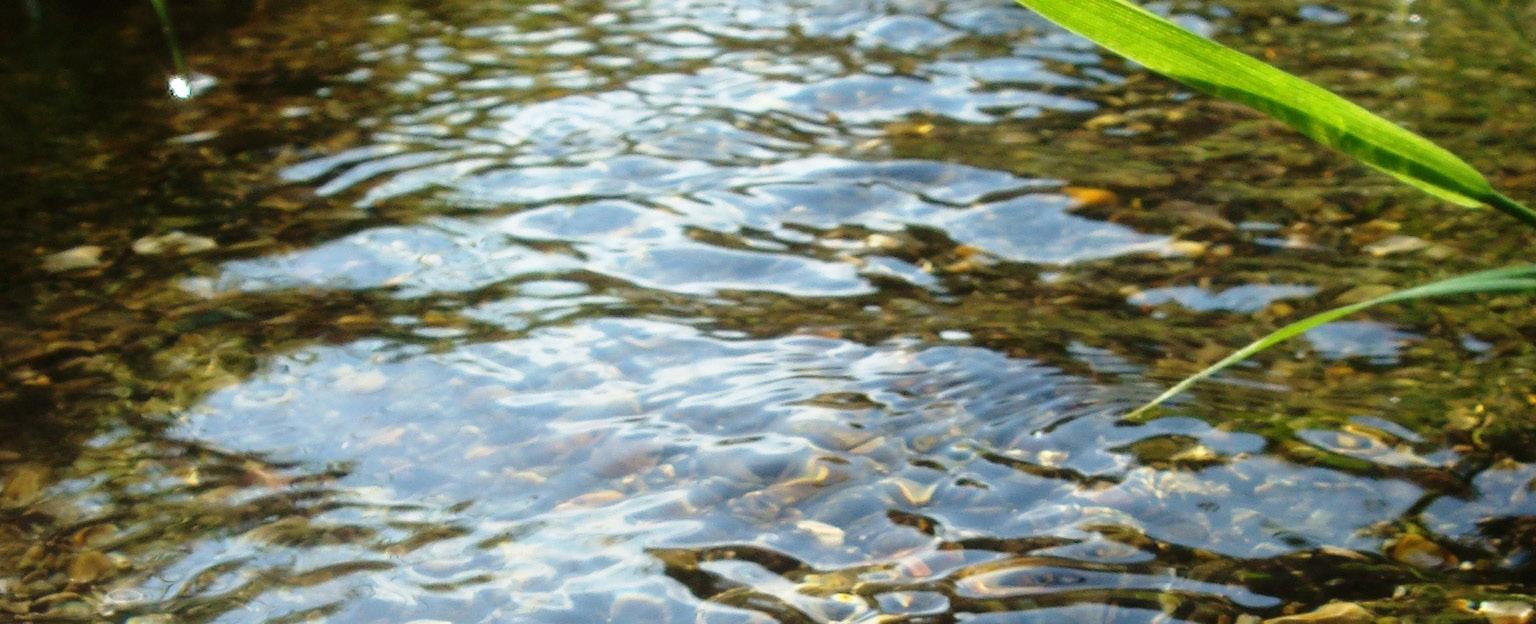

Impacts.
CWED’s research influences policy and industry best practice by advancing sustainable agricultural water management in the long term. These projects have directly contributed to improved irrigation strategies, enhanced farm resilience, and bolstered climate adaptation planning across the UK and internationally. With over 100 peerreviewed publications and collaboration with UK Research Councils, Defra, the European Commission, and FAO, CWED’s expertise continues to lead the way in global water management.
To further strengthen its impact and outreach, CWED is focusing on:
• Adapting to Agro-Economic Policy Shifts: Employing horizon scanning techniques to anticipate and handle policy changes and ensure long-term sustainability of both rainfed and irrigated agricultural systems.
• Scaling Rainwater Harvesting in Protected Cropping: Encouragement of widespread adoption of rainwater collection in soft fruit production to improve water security and reduce environmental impact.
• Advancing Multi-Use Reservoirs with Renewable Energy: Expanding integration of floatovoltaics innovation to optimise water storage whilst generating sustainable energy, helping to reduce over reliance on fossil fuels and lowering costs for farmers.
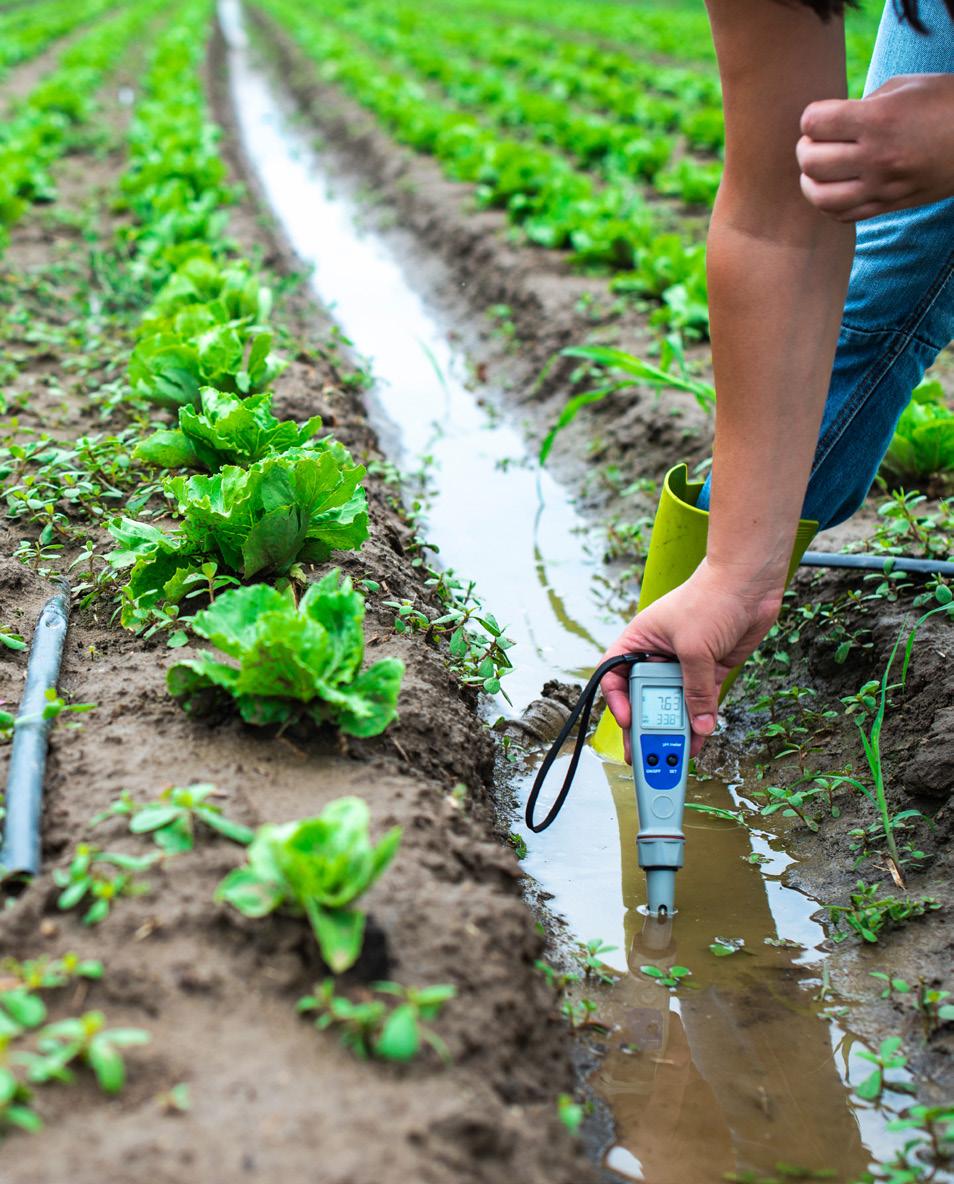
• Assess Your Water Use & Storage: Conduct detailed water audits to identify inefficiencies and explore alternative water sources such as rainwater harvesting.
• Integrate Technology & Innovation: Consider implementing advanced decision-support tools to optimise water management and prepare for upcoming policy changes.
• Engage with wider community: Researchers, policymakers, and other farmers to share insights and develop regionspecific water resilience strategies to combat impacts of climate change.
• Explore Renewable Energy Options: The utilisation of multi-use reservoirs with floating solar panels to enhance both water and energy efficiency, reducing costs and environmental impact.
• Plan for Climate Resilience: Future-proof farming practices by investing in adaptive strategies such as improved irrigation methods and diversified water storage solutions.
By integrating research with practical implementation, CWED continues to support farmers, policymarkers and the wider agri-food industries.
Tom Storr. Managing
water across a diverse farming system.


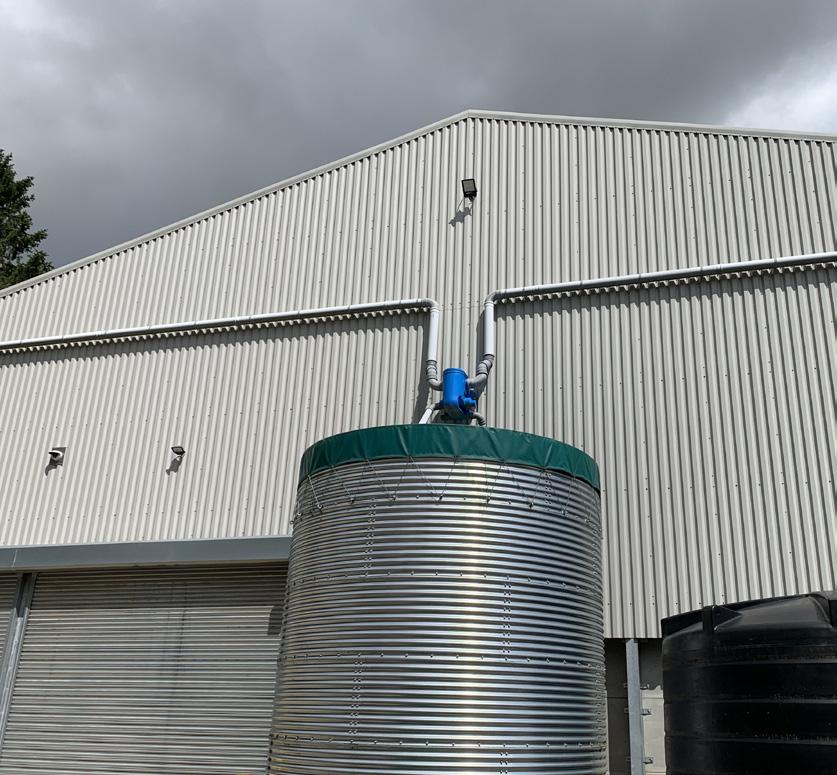
Dyson Farming is committed to advancing its sustainable water management techniques across its diverse farming system. By participating in the BoE programme, the business gains access to an invaluable platform for peer-to-peer learning, knowledge exchange, and policy engagement.
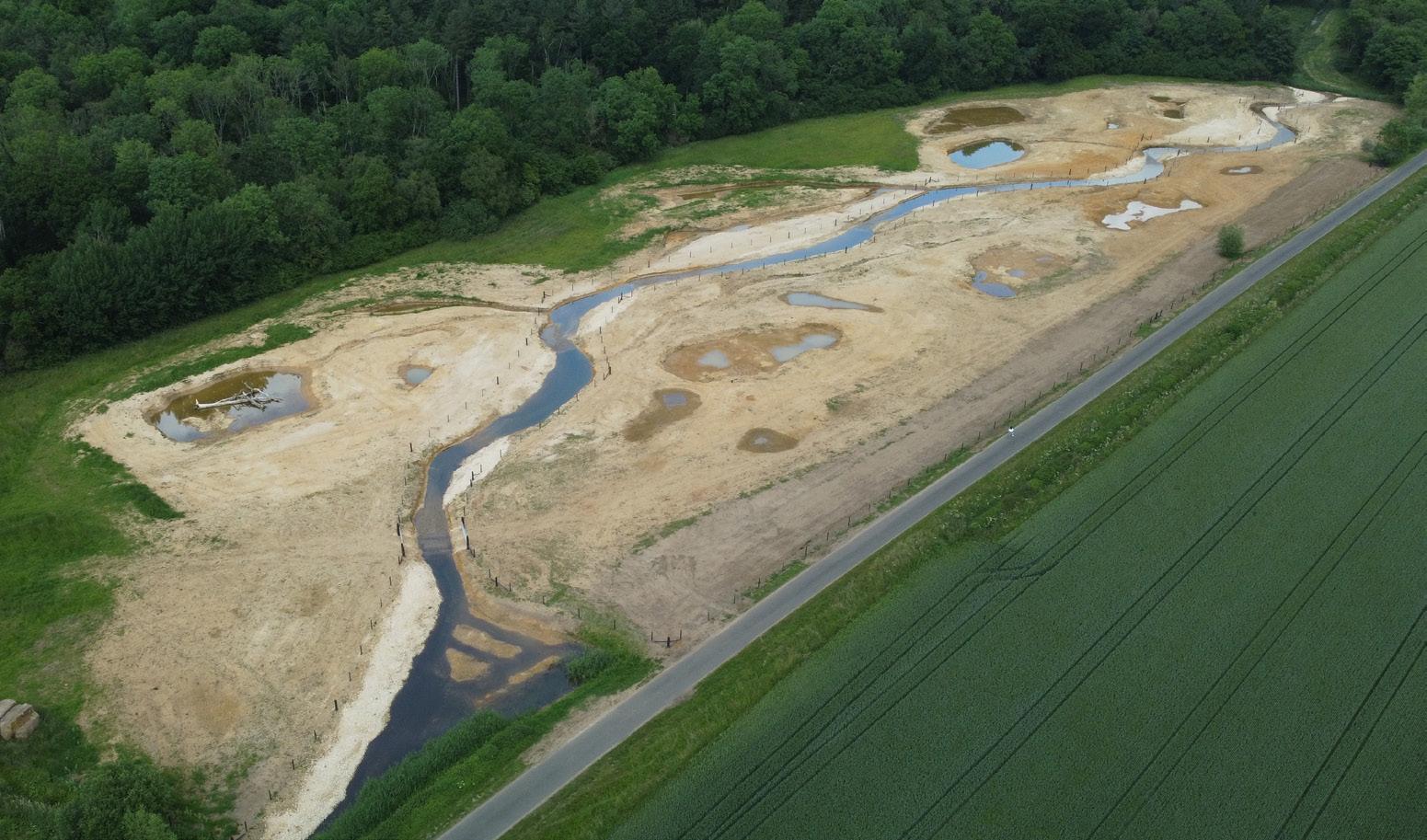
Motivation to join Beacons of Excellence.
Water is one of the most critical resources in large-scale farming, impacting a range of factors including crop yields, livestock health, and longterm sustainability. Dyson Farming recognises that responsible water management is not only essential for productivity but also for protecting the natural environment. The decision to join BoE reflects the company’s ambition to be at the forefront of responsible water use, helping to shape industry standards and influence policy. Through BoE, Dyson Farming is actively engaging with stakeholders, sharing insights, and implementing cutting-edge solutions to effectively balance water supply, demand, and conservation.
Dyson Farming, Lincolnshire

Dyson Farming
Current practices.
• Regular sampling and analysis before and after water enters fields helps identify pollutants, monitor nutrient levels, and optimise water usage.
• A 200,000 m³ reservoir alongside an additional seven reservoirs, provide a stable water supply. These store water during wet seasons, ensuring availability during dryer periods, reducing dependency on groundwater abstraction, and safeguards water security for crops and livestock.
• Holistic strategy based on the Integrated Farm Management (IFM) principles:
◊ Precision Farming - Advanced technology ensures targeted application of plant protection, significantly reducing overuse and minimising water contamination.
◊ Buffer Strips & Field Margins strategically placed to minimise runoff, trap sediments, and create wildlife habitats.
◊ Drip tape and boom irrigation methods ensure water is applied directly to plant roots, reducing evaporation and preventing disease spread.
• In partnership with the Environment Agency, Dyson is involved in a river restoration project that improves water quality and enhances freshwater habitats. By allowing the beck to follow a more natural course, water flow variability increases, improving filtration, sediment deposition, and biodiversity.
• A substantial portion of Dyson’s water needs are met through rainwater harvesting. glasshouse runoff is collected and stored in two freshwater lagoons (36,000 m³), helping reduce reliance on external water sources.
• Drought-resistant herbal leys are used to improve soil health, increase resilience to drought, and reduce dependency on additional irrigation.
• Team members receive training in public speaking, enabling them to educate the wider agricultural community, influence policy discussions, and promote sustainable water management practices.
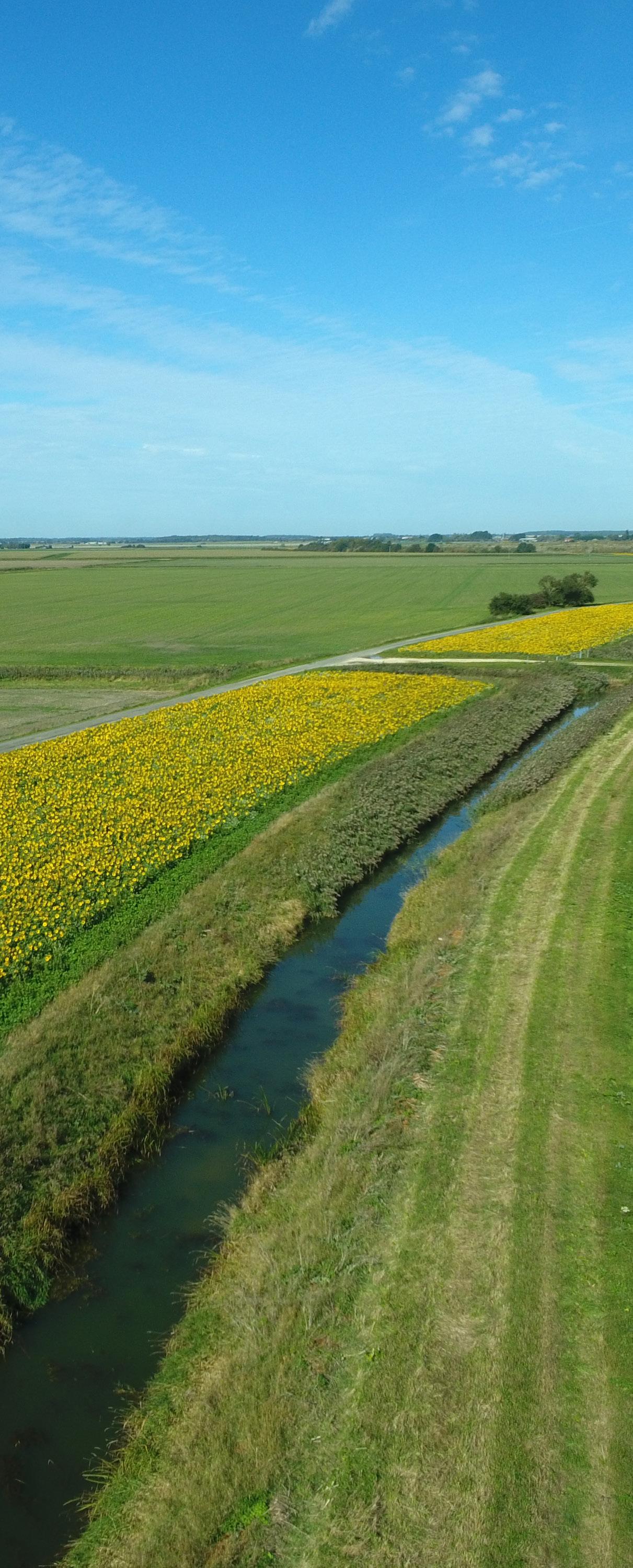
Impacts.
By adopting these strategies, Dyson Farming has observed significant benefits:
• Water sampling helps assess impact on local ecosystems, allowing targeted interventions to prevent contamination and improve water purity.
• By storing water during high-flow periods, the farm reduces reliance on abstraction during dry spells, lessening pressure on natural water sources.
• The re-meandering project has already yielded positive results, with increased biodiversity, improved water clarity, and healthier aquatic ecosystems.
• Since 2022, ongoing research into cover crops has provided valuable insights into soil structure improvement, nutrient retention, and water conservation, helping refine Dyson’s future farming practices.
Future planning & advice.
Upcoming initiatives include:
• A more streamlined and efficient approach to winter sampling will improve data accuracy and responsiveness in managing water quality.
• Using GPS mapping to locate and maintain field drainage systems will prevent waterlogging, enhance soil stability, and improve overall farm productivity.
• Strategic planting of companion crops and contour breaks will help reduce soil erosion, improve water retention, and further protect water sources.
Advice to farmers.
• Longer term investment in complex water storage systems such as onfarm reservoirs and rainwater harvesting systems can significantly reduce reliance on external water sources, providing greater security during drought.
• Optimising field drainage via GPS mapping of drainage systems helps improve efficiency, prevent erosion, and enhance water infiltration.
• Cover crops and buffer strips help improve soil structure, enhance water retention, and support biodiversity, leading to healthier and more sustainable farmland for long term resilience.
• Effective communication and collaboration with policymakers, environmental groups, and fellow farmers can drive positive industry-wide change and projects such as BoE are at the forefront of this. Get involved!
Jeremy Durrant.
Integrating livestock and water management for sustainable farming.

EW Davies Farms, Essex
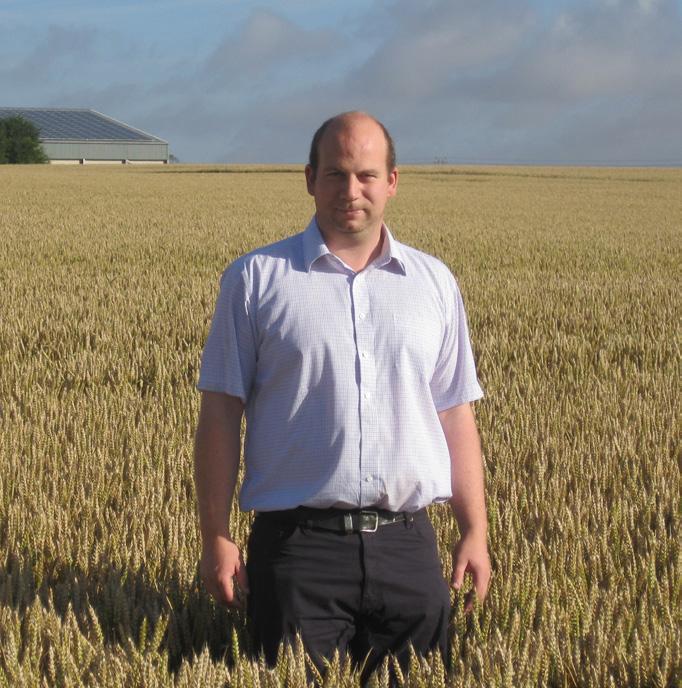
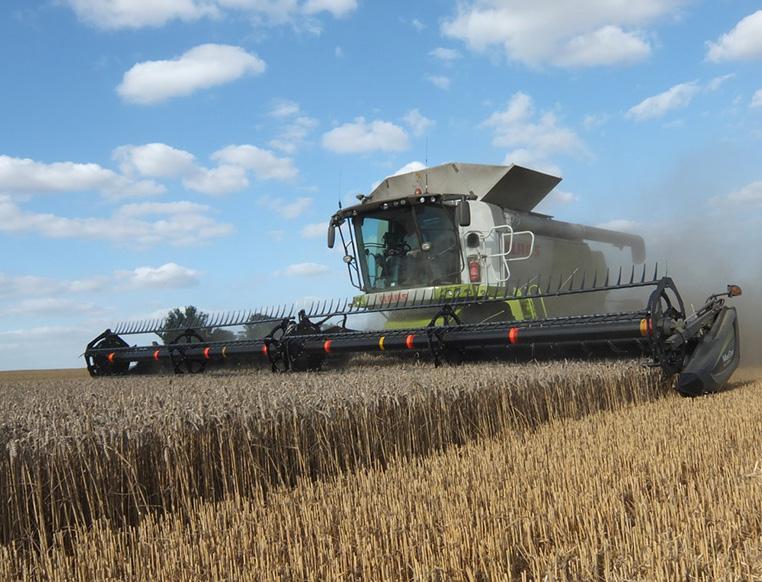
E W Davies Farms is a family-run arable enterprise and LEAF
Demonstration Farm committed to sustainability through Integrated Farm Management (IFM). With a diverse cropping rotation including combinable crops, sugar beet, grass leys, and environmental mixes, the farm has also introduced a 350-strong Polled Dorset sheep flock and a B&B pig enterprise. A key focus is sustainable water management, ensuring efficient usage across cropping and livestock systems to improve resilience and environmental responsibility. Introduction.
Motivation to join Beacons of Excellence.
Water is an essential asset on the farm, especially following the integration of livestock, which has increased demand. Through BoE, E W Davies Farms aims to enhance sustainable water management practices, improve biodiversity, and build resilience against extreme weather conditions.


E W Davies Farms

Impacts.
The farm’s IFM approach provides a holistic understanding of water’s role in the entire system, enhancing productivity while protecting natural resources. Increased water storage and improved drainage has led to reduced runoff, better field conditions, and increased habitat diversity.
Current practices.
• The farm has installed rainwater collection tanks to capture runoff from roofs and natural springs, significantly reducing reliance on mains water. This stored water is primarily used for spraying, easing pressure on local water infrastructure. Field drainage systems have been implemented to manage the heavy clay soil, ensuring land remains accessible even during wetter periods.
• Restoring and maintaining older ponds, alongside creating new ones, has improved water retention, and boosted biodiversity.
• A dedicated reservoir platform enables local primary school children to engage in educational activities focused on water conservation and ecosystem health.
• Additionally, effective ditch management has reduced waterlogging, supporting better soil and crop health.
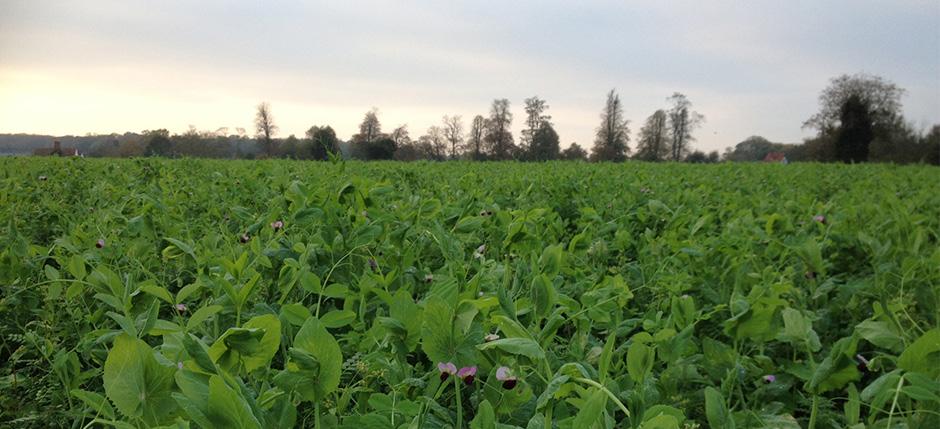

Future planning.
To further improve resilience, the farm plans to expand rainwater storage capacity for irrigation, decreasing reliance on mains water. Additionally, excess collected water will be redirected back into the river network during low-flow periods, reducing strain on natural water sources and supporting the broader ecosystem. Continued monitoring and adaptive management will also help to ensure long-term sustainability and wider consideration of the environment.
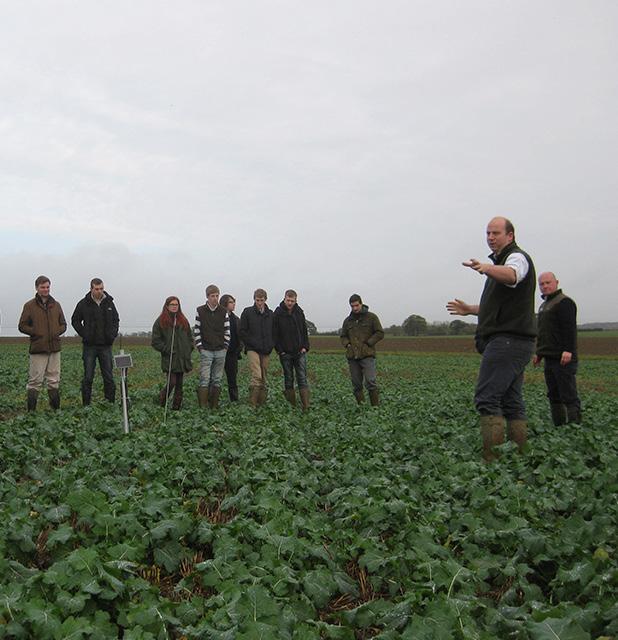
• Assess your farm’s water usage, identify inefficiencies, and explore viability of options such as rainwater harvesting or alternative sources.
• If dealing with heavy soils, the installation of field drains can make land more accessible, as well as reduce waterlogging.
• Restoring existing ponds or creating new ones can enhance biodiversity and further improve water retention.
• Involving local schools or community groups in water conservation initiatives helps raise awareness and fosters longterm environmental responsibility among younger generations.
• Plan/budget for future water needs - Think about long term water needs and consider increasing storage capacity and integrating water recycling systems to minimise dependence on mains water and enhance resilience against climate variability.
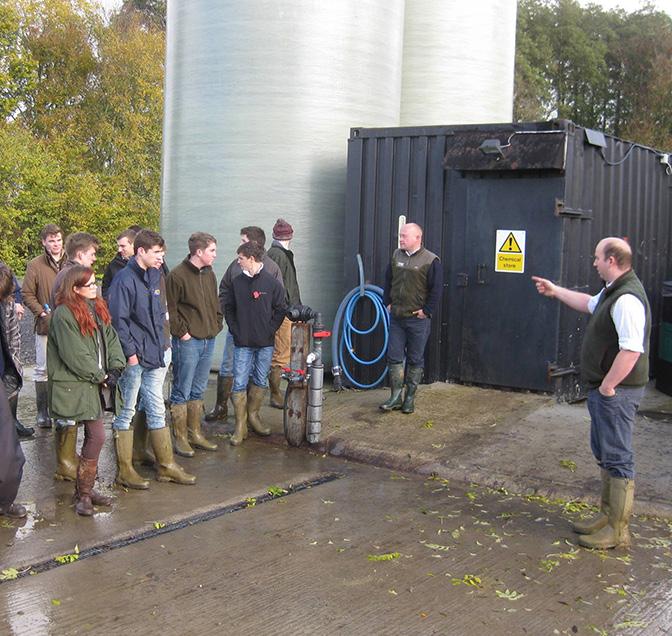
Mark Wilkinson.
Pioneering research into flood management and more nature based solutions.

James Hutton Institute, Scotland

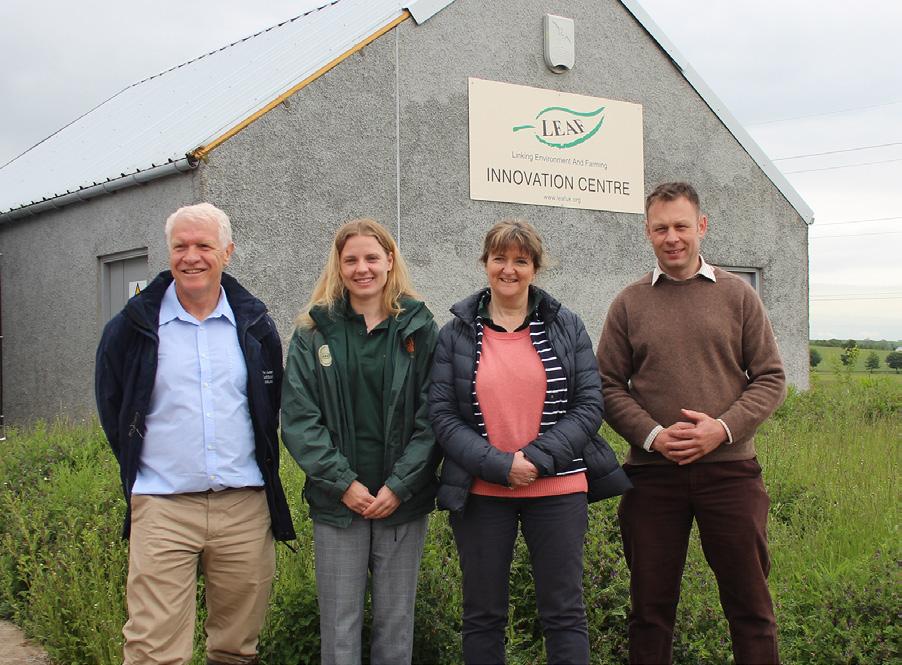
The James Hutton Institute is a world-leading research organisation focused on developing and researching the complexities between sustainable land usage, agriculture, and environmental science. As one of Scotland’s LEAF Innovation Centres, the Institute brings together cutting-edge scientific research alongside practical, real-world application to tackle the most pressing challenges in food security, climate change, and natural resource management.
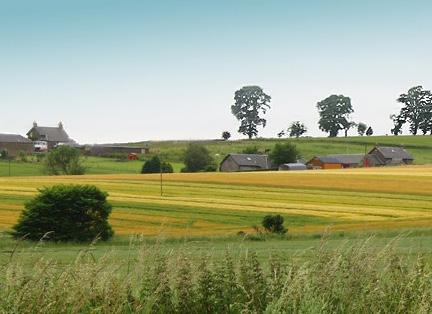
Motivation to join Beacons of Excellence.
The James Hutton Institute founded in 2011, works at the forefront of pioneering research and innovation, exploring a range of prominent ecological topics including finding sustainable water management solutions through rigorous scientific research. Joining the BoE project allows JHI to share its expertise, contribute to sector wide knowledge exchange, and collaborate with industry leaders to develop and implement nature-based solutions for complex water-related challenges.
Current water management practices.
Situated at its research sites in Aberdeen and Dundee, JHI implements and evaluates water management strategies, including:
• Working alongside Natural Flood Management Scotland (NFM), JHI have developed a range of Nature-Based Solutions (NBS) which address prevalent water challenges via river restoration, landscape modifications, and monitoring technologies to track water supply fluctuations.
• Investigating pollution retention methods such as 3D buffer strip zones to reduce runoff, as well as assessing the broader ecological benefits.
• Enhancing landscape features to slow down water flow and improve flood storage capacity. Their research areas focus on designing, placing, and evaluating the effectiveness of flood barriers across a range of farming systems and landscapes.
• Runoff Attenuation Features (RAF): Exploring temporary interventions such as ponds and leaky barriers to help manage water flow and storage during peak rainfall events. This helps build long term strategies to combat fluctuations in water management.
• Magic Margins & Community Engagement: Testing tied ridger techniques to control water movement, particularly in vegetable production. Findings are shared via the ‘Magic Margin Podcast’ to enhance outreach and community involvement.
• Water-Related Ecosystem Services: Advancing NBS research to enhance water quality, biodiversity, and carbon sequestration through natural processes.

James Hutton Institute
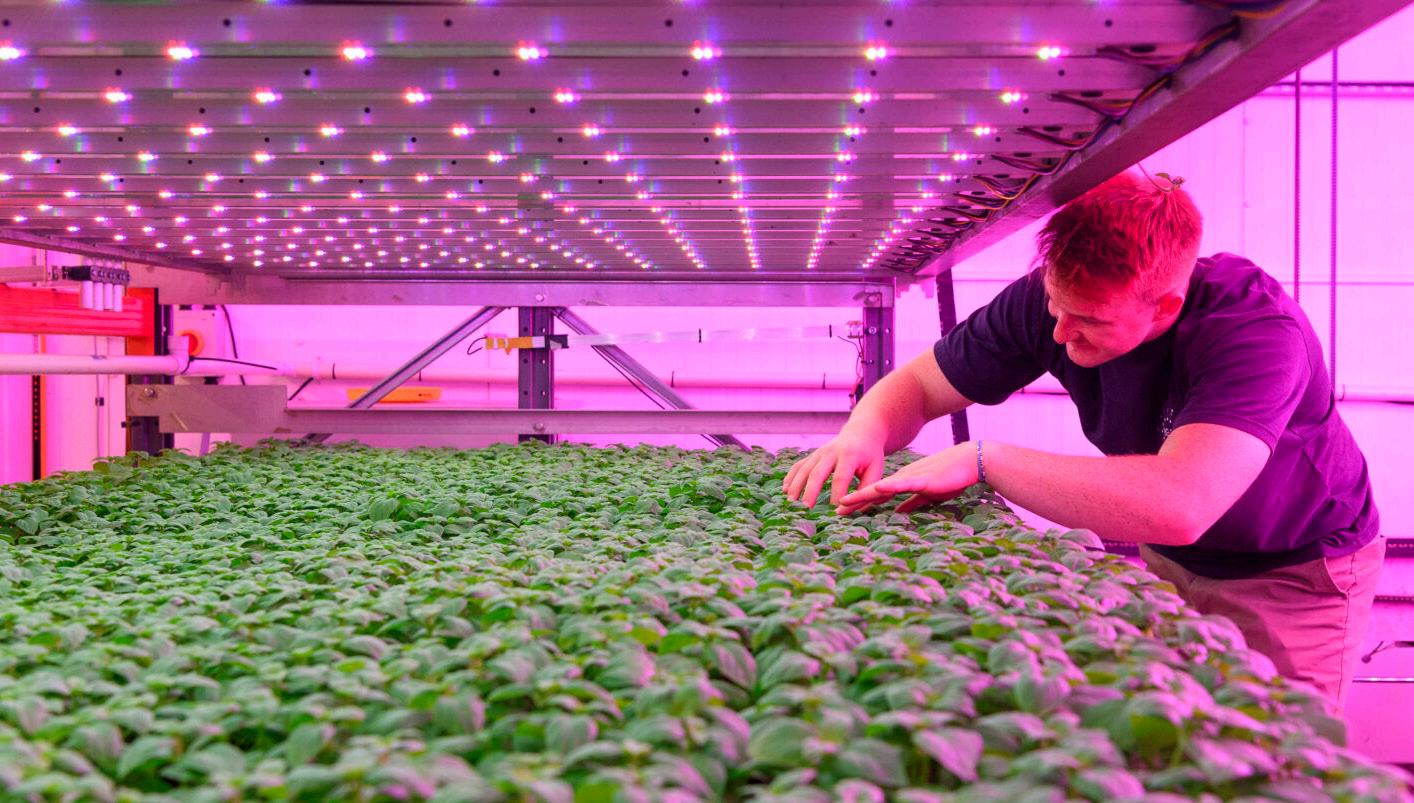
Impacts.
Strengthening industry resilience by mitigating the risks of extreme weather events, such as floods and droughts, through science-driven solutions.
Contributing to policy development and sustainable farming strategies by generating robust, research-backed evidence.
Enhancing collaboration between researchers, farmers, and policymakers to promote best practice and scale up effective water management strategies.
Expanding community engagement and knowledge-sharing to encourage wider adoption of sustainable agricultural practices.

James Hutton Institute
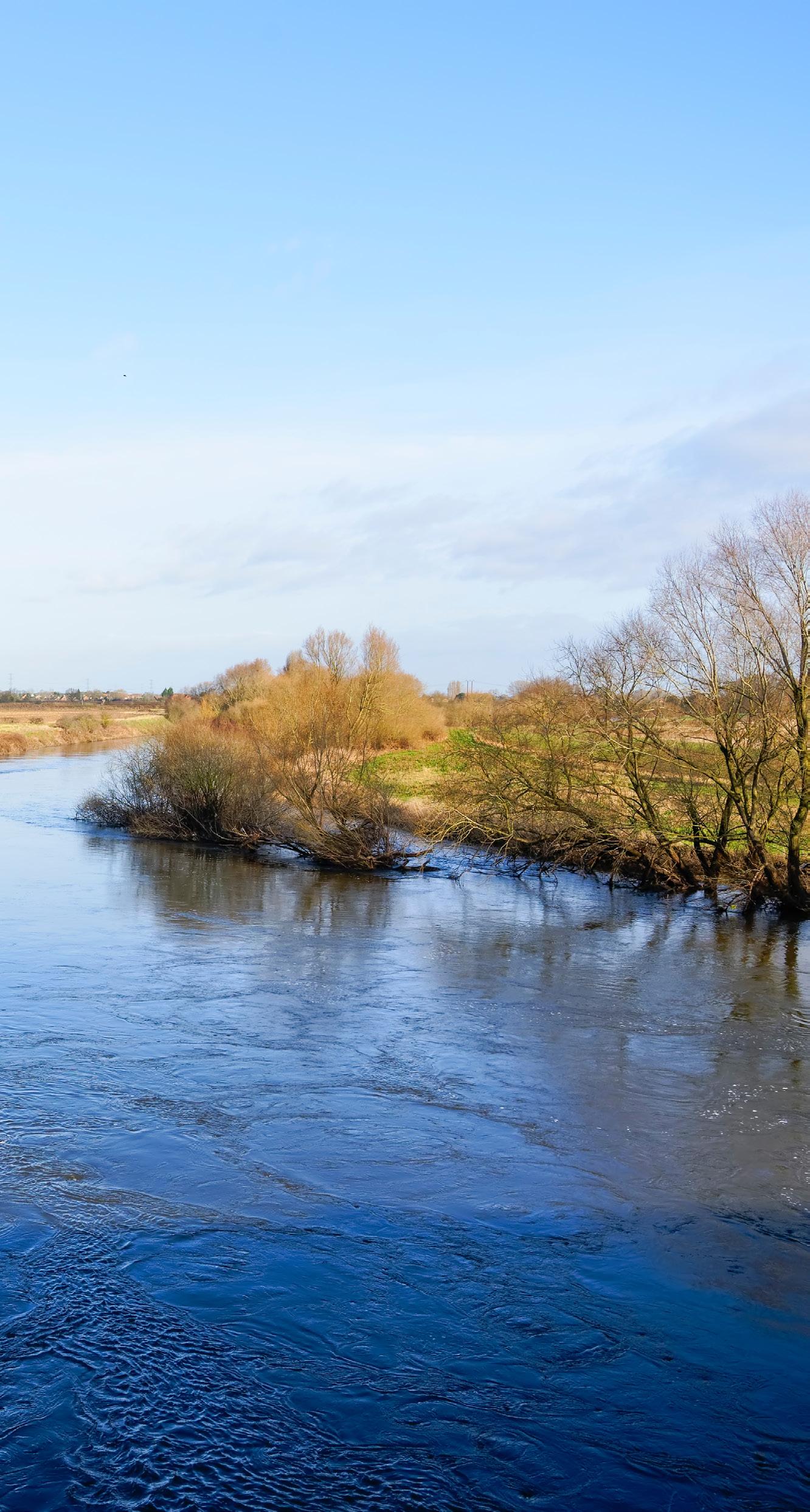
Future planning & advice for the industry.
• As climate change continues to intensify, there is greater need for research and funding to enhance flood mitigation and drought resilience. Developing advanced hydrological systems, early warning systems and extensive water management policies is crucial in reducing risk on agricultural communities.
• Significant research gaps remain regarding the efficacy of runoff attenuation measures in managing water flow. Conducting more extensive studies help refine strategies for controlling these events, ensuring policymakers have access to the most reliable information when designing flood prevention frameworks. Bridging the gap between scientific research and policy creation will create a more adaptive approach to sustainable water management.
• By integrating NBS on a larger scale in the long term, farmers can work to further improve factors such as water retention, soil erosion and biodiversity.
• Encouraging peer-to-peer learning within the BoE network will be essential in ensuring that innovative water practices are widely adopted. By co-creating platforms for collaboration, farmers and stakeholders will be better equipped to make informed, science-based decisions that enhance land and water resource management.
Through ongoing research, strategic collaboration, and the integration of cutting-edge scientific development, the James Hutton Institute remains committed to advancing sustainable water solutions. These efforts support agricultural resilience, safeguard biodiversity, and enhance climate adaptation strategies, ensuring a more sustainable and water-secure future for farming communities.
Sandy Booth.
Innovative water management in soft fruit and asparagus production.

The New Forest Fruit Company, Hampshire
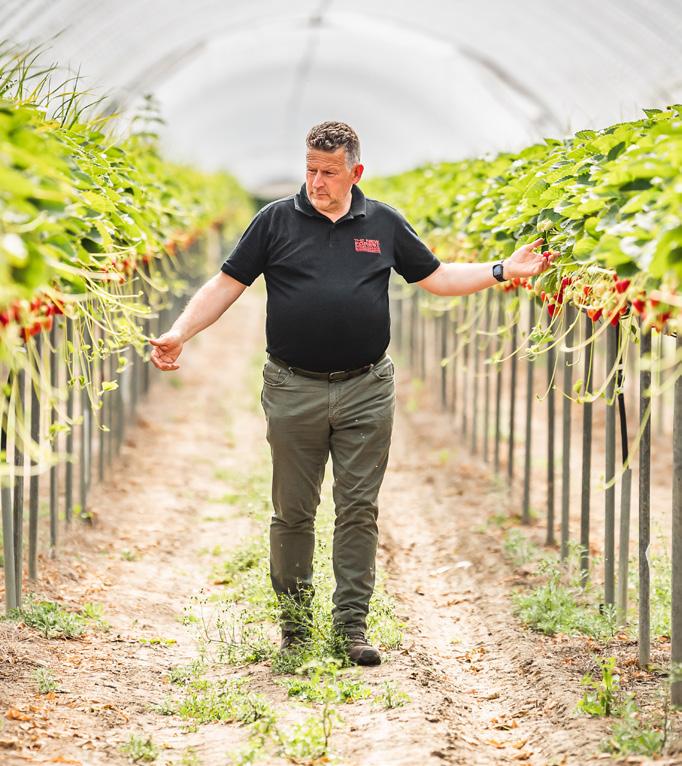
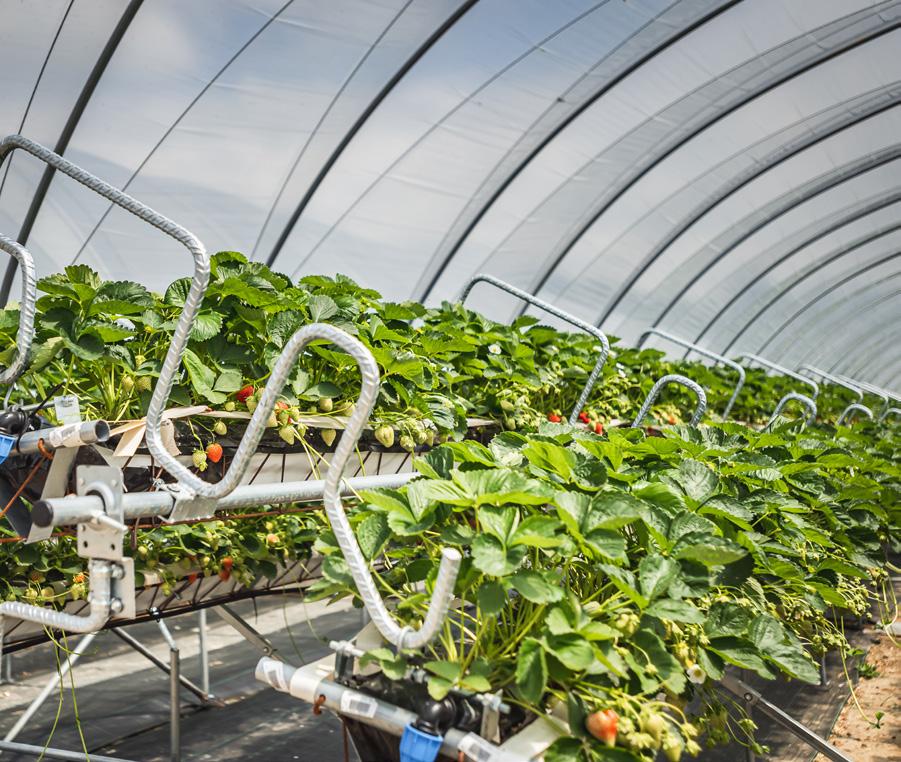
As a well-established LEAF Demonstration Farm, The New Forest Fruit Company (NFFC) has placed itself at the forefront of sustainable water management in the UK, pioneering innovative trials and practices to improve their practices. Specialising predominantly in early-season soft fruit and asparagus production, NFFC works collaboratively with its partners to integrate innovative water conservation methods onto their farms, and simultaneously enhancing productivity.
Motivation to join Beacons of Excellence.
Water remains vital for high-quality soft fruit production, and NFFC is dedicated to ensuring efficient water usage. Through joining the BoE project, the company aims to share its expertise with the wider farming community, engage with policymakers to make strategic change, and promote advanced water conservation strategies that benefit both the industry and the environment.
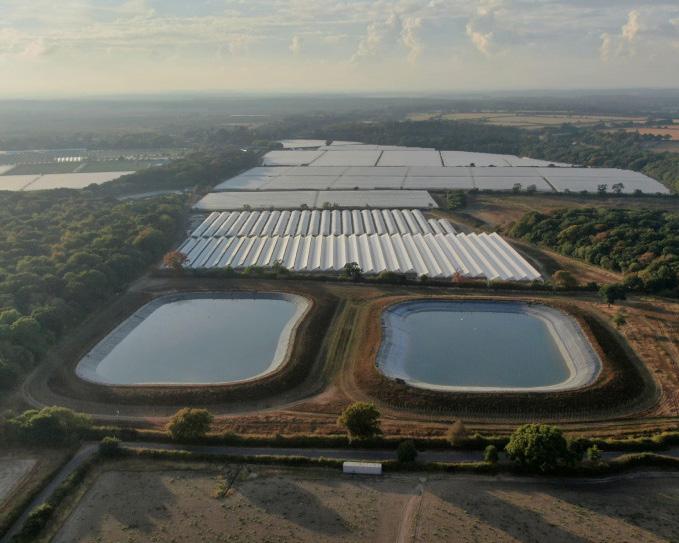

Current practices.
NFFC has implemented numerous sustainable water management strategies, including:
• Rainwater Harvesting & Stream Abstraction: The farm operates across three polytunnel production sites, which comprise of a combination of both stream-abstracted water and harvested rainwater to irrigate crops efficiently while minimising wastage.
• Reservoirs & Water Storage: Three linear reservoirs, with a total capacity of up to 45,000 cubic metres, store water collected during high-availability periods for later use during drought conditions. Integrated aeration systems help maintain both water quality and oxygenation.
• Advanced Irrigation Monitoring: Real-time moisture sensors conduct daily spot checks to ensure precise water application, working to limit waste and optimising plant health.
• Water Treatment Innovations: Stored water undergoes the process of aeration and filtration before usage, with early trials demonstrating the effectiveness of these treatments in enhancing water quality.
• Biodiversity & Soil Health Enhancements: Oxygen monitoring and stabilisation techniques promote stronger root depths and systems, reducing the need for chemical fungicides by introducing beneficial fungi and bacteria.
NFFC’s proactive approach to water management has led to:
Reduced reliance on mains water:
By maximising the use of harvested rainwater and stored reservoir water, the farm reduces its dependence on external water sources. This enhances flexibility in irrigation scheduling and crop nutrition, allowing for more precise water application that aligns with the needs during each critical growth stage.
Improved water quality:
The multi-stage treatment process, including aeration and filtration, ensures that water used for irrigation is of a high standard. Cleaner water reduces risk of disease and contamination, leading to healthier crop production.
Healthier root systems and reduced need for chemical fungicides:
The integration of beneficial microbes strengthens plant roots, making them more resilient to stress. This approach reduces reliance on chemical fungicides, fostering a more sustainable growing environment.
Greater resilience against climate variability:
By implementing robust water storage and monitoring systems, NFFC guarantees a steady water supply during periods of drought or unpredictable weather. This long-term strategy secures farm productivity and sustainability against the ever-changing climate conditions.

Future Planning.
To further improve its water sustainability, NFFC is focusing on:
• Constructing an additional reservoir at the Newhouse Farm site to further reduce reliance on mains water.
• Exploring microbiological water improvement techniques to enhance natural filtration and rainwater channelling efficiency.
• Integrating rainwater harvesting into new production facilities to strengthen water security during dry periods.
• Build reservoirs and harvesting rainwater reduces dependence on mains water and enhances long-term resilience.
• Optimise irrigation through continuous monitoring using real-time sensors and tracking water usage can significantly improve efficiency and reduce waste.
• Improve water quality through aeration, filtration, and microbiological treatments to maintain optimal irrigation water standards.
• Integration of renewable energy such as solar-powered water systems can help offset energy costs and improve sustainability.
• Collaborate with industry peers through BoE or other networks ensures continuous improvement and adaptation to new challenges.
By combining traditional farming methods with modern technological advancements, NFFC continues to lead the way in sustainable water management, ensuring a productive future while protecting vital natural resources.


Scott Raffle.
Reducing water use while maintaining yield and quality in soft fruits.

NIAB WET Centre, Kent

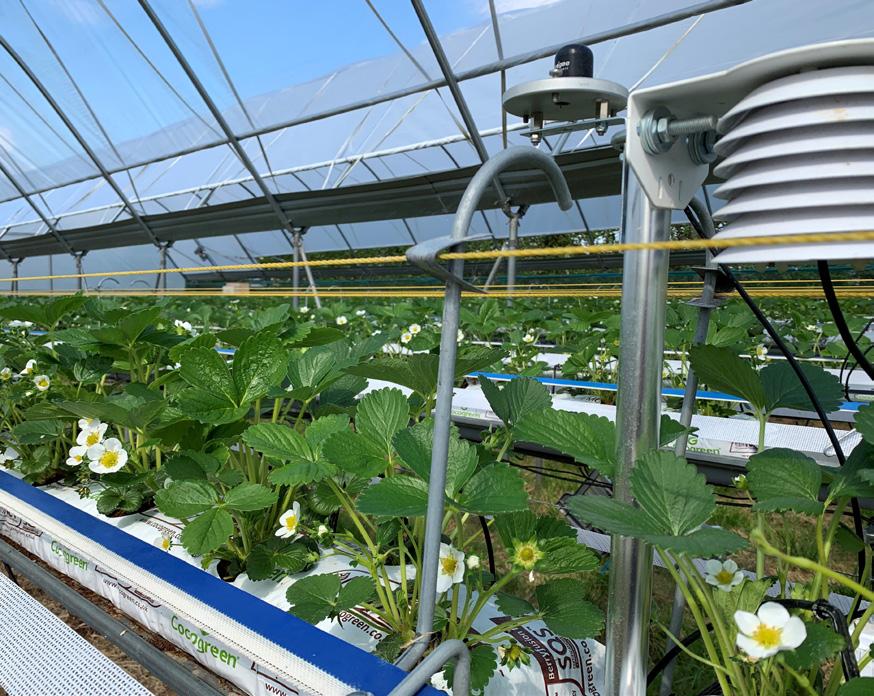
The NIAB Water Efficient Technologies (WET) Centre at East
Malling is a leading research facility, working to demonstrate innovative water-saving techniques for commercial soft fruit growers across the UK. The BoE programme has helped facilitate their efforts via peer-to-peer learning, knowledge exchange, and engagement with policymakers, making NIAB’s participation essential in advancing industry-wide engagement in sustainable water practices.
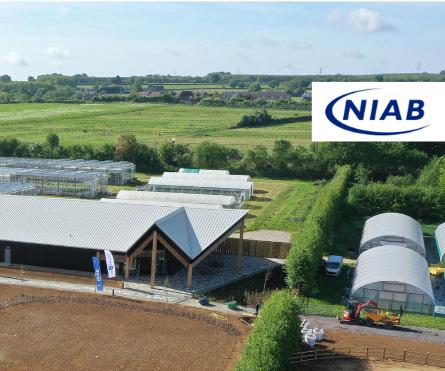
Motivation to join Beacons of Excellence.
NIAB is committed to pioneering research that improves both water efficiency whilst maintaining yield and fruit quality. By joining BoE, NIAB hopes to share its renowned expertise in precision irrigation, fertigation, and runoff management to name a few, whilst simultaneously gaining insights from other participants and stakeholders to refine and expand its research scope and formulate new ideas.
Current water management practices.
• Advanced moisture sensors (Delta-T Devices) and Netafim smart irrigation systems are implemented to improve precision, optimise water delivery, and reduce overall wastage.
• Installation of cutting-edge technology to assess water runoff levels, and to identify opportunities for further water conservation.
• Optimised Crop Watering: Conducting and overseeing novel research trials to evaluate the effectiveness of improved irrigation methods for optimal water distribution considering plant availability and demand.
• Rainwater Harvesting: Data-driven system designed to maximise rainwater storage and reuse.
• On-Demand Irrigation Services: Providing commercial growers with precision irrigation recommendations based on real-time data, thus achieving optimum plant and crop health.
• Nutrient Optimisation: Raspberryspecific nitrogen demand models drawn up to improve fertigation efficiency to minimise excess nutrient application.
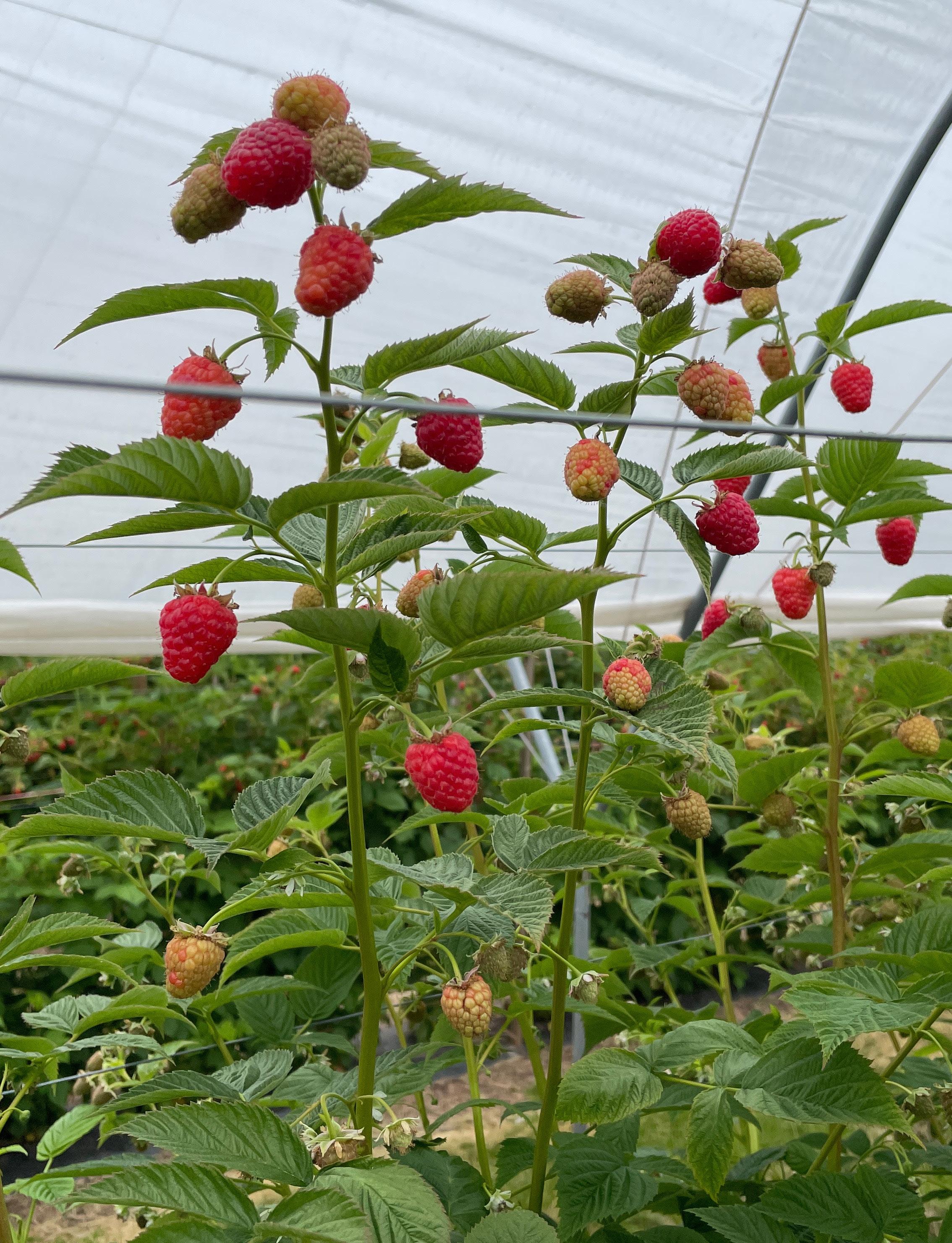

Impacts.
Strawberry Production
• Water consumption has been optimised, which led to a reduction of up to 33% without compromising crop yield or quality. By implementing advanced irrigation and precision water management, crops can remain healthy and productive while using significantly less water.
• Irrigation runoff reduced to just 5%, ensuring the majority of water is absorbed by the plant and soil. This helps to conserve water, while also preventing wastage, contamination and soil erosion.
• A highly effective rainwater collection and reuse system contributes to an impressive 90% water selfsufficiency during drier seasons. By capturing, storing and redistributing rainwater, dependence on external water supplies is significantly reduced.
Raspberry Production
• Maintaining runoff below 15% prevents yield losses in most varieties.
• Managing water deficits optimises leaf gas exchange and plant health.
• Up to 90% reduction in nitrogen inputs without compromising fruit yield or quality.
Future Planning.
NIAB is seeking funding from Defra’s Future Farming Programme to enhance resource efficiency, support sustainable fruit production, and ultimately reduce their environmental footprint. Future research topics include optimal irrigation dripper designs and new Netafim technology, which will improve nutrient and water delivery in raspberry production.
Precision fertigation trials with industry partners Yara and Stoller will also further help to enhance efficiency, shelf life, and crop resilience.


Expansion & New Developments.
The WET Centre has recently introduced novel raspberry tunnel trials focusing on reducing fertiliser use and greenhouse gas emissions, based upon nitrogen-demand models. They will also work to test new irrigation technologies to minimise yield losses and explore how biostimulants can enhance resilience, yield, and fruit shelf life.
• Modern precision irrigation technologies minimise water waste whilst ensuring optimal crop productivity. Explore options like drip irrigation, soil moisture sensors, or automated scheduling to find the best fit for your farm.
• Regularly assess runoff patterns to identify inefficiencies and areas for improvement. Implementing contour farming, cover crops, or buffer strips can help retain water and prevent soil erosion.
• Investment in rainwater harvesting systems, expansion of reservoirs, or creation of retention ponds to improve water availability. These methods enhance self-sufficiency and reduce dependence on external sources.
• Test and refine nutrient management strategies to improve efficiency. Precision fertigation delivers nutrients directly to plant roots, improving absorption rates and reducing waste, without sacrificing yield.
By incorporating cutting-edge research and technology with commercial application, NIAB’s WET Centre continues to remain at the forefront of driving innovation in water efficiency. They are massively helping soft fruit growers nationally adopt sustainable and resource-efficient practices to secure a more viable farming future.


Nicolas Corker. Driving
ground breaking water resilience research and innovation.

UKCEH (Centre of Ecology & Hydrology), Oxfordshire

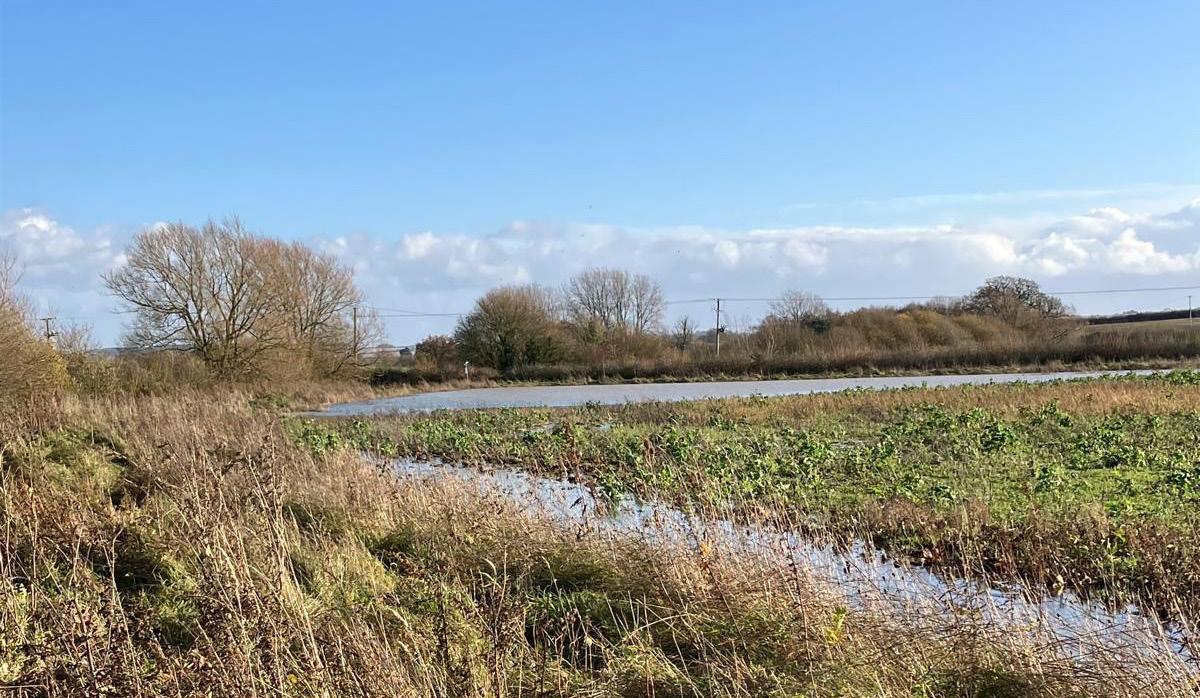
UKCEH operates research sites across the UK, partnering with a wide network of farms. The centre works closely with LEAF Marque certified farms to trial sustainable practices addressing water management, biodiversity, and land use. UKCEH bridges scientific research and practical farming, ensuring innovations are both scientifically robust and farm specific. It delivers realtime, on-farm trials promoting Integrated Farm Management (IFM) to enhance productivity, protect natural resources and build resilience to climate change.
Motivation to join Beacons of Excellence.
UKCEH joined the BoE initiative to support the agricultural transition to more sustainable water management by hosting our second annual BoE event, showcasing the scientific research alongside practical farm-level innovation. Through sector wide collaboration, UKCEH aims to help farmers make data-informed decisions that balance productivity with environmental protection enabled, for example, by the UKCEH E-planner app.
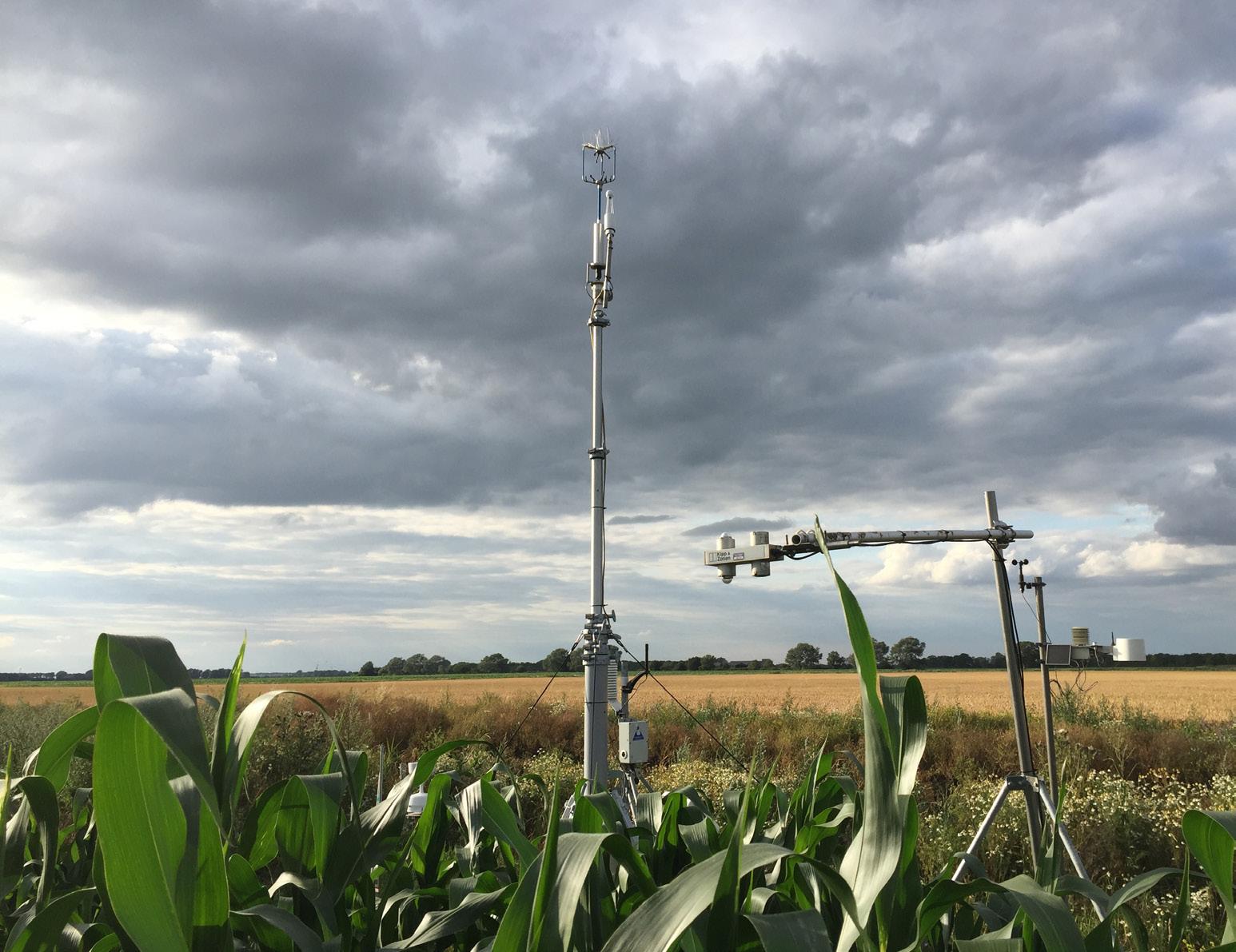
Current practices.
UKCEH works across a range of research areas including soil and moisture measurement, reservoir evaluation, future crops scenario mapping to inform mitigative measures and exploring the direct impacts of renewable energy solutions for both water quantity and quality.
SpongeScapes – Resilient Landscapes via Natural Water Retention
Coordinated by UKCEH, SpongeScapes evaluates nature-based water management features (wetlands, floodplains, bunds) across Europe. In Oxfordshire’s Evenlode Catchment for example, interventions have included:
• Leaky dams & contour bunds to slow runoff
• Riparian woodland planting for infiltration & stability
• Wetland restoration for water quality & biodiversity
Advanced monitoring tools (cosmic-ray neutron sensors, flux towers, soil probes) are then implemented to track environmental impacts. SpongeScapes therefore provides scalable evidence for integrating natural infrastructure into farming to build climate resilience.
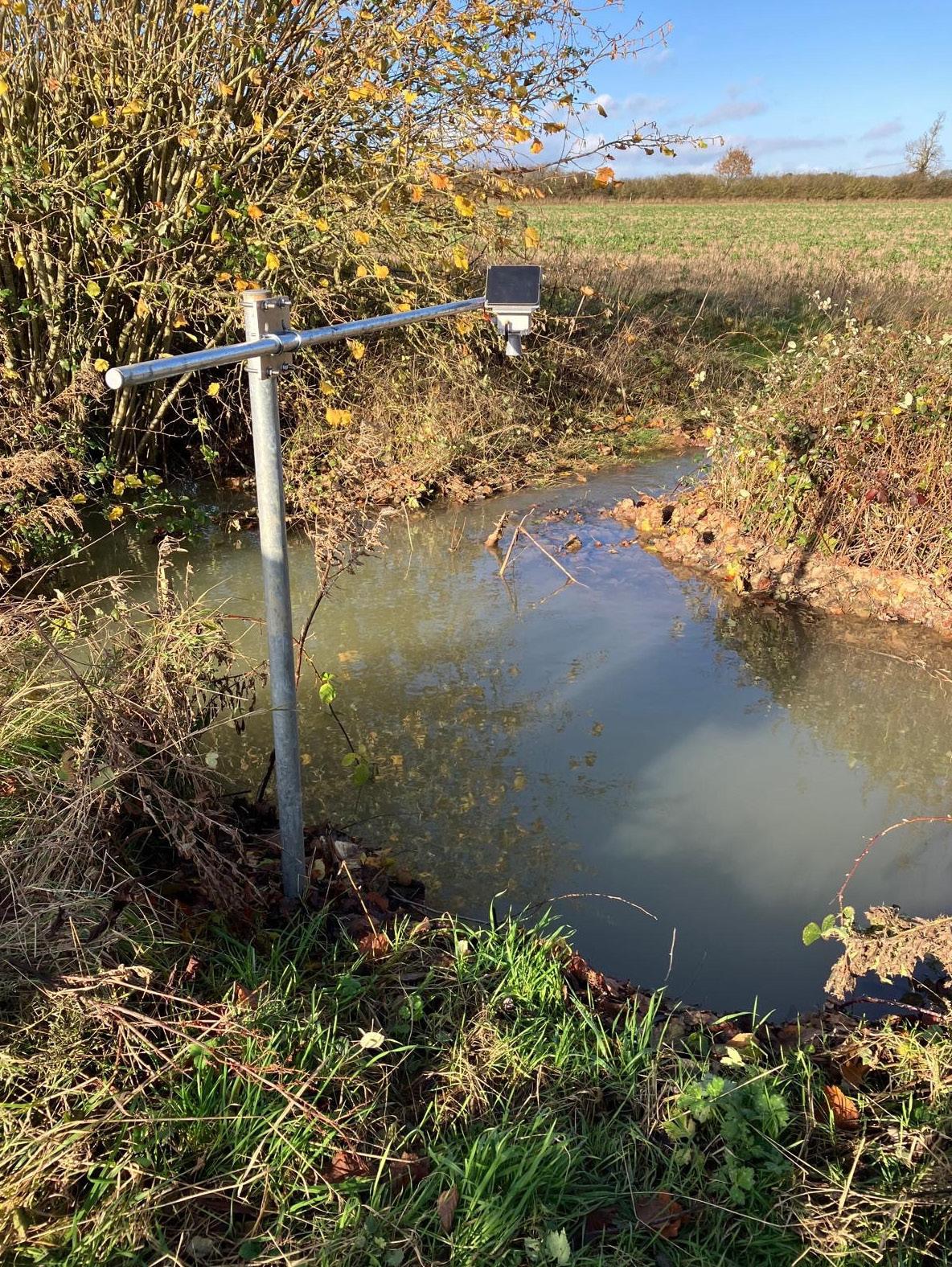

AgZero+ – Towards Net Zero Plus Farming
Led by UKCEH and Rothamsted Research, AgZero+ helps arable and livestock farms cut emissions while enhancing biodiversity, water, and soil health. It delivers:
• On-farm trials to test practical, emissionsreducing solutions
• Real-time environmental monitoring via sensor networks
• Modelling of land-use outcomes and naturebased benefits
• Science-based guidance on carbon, nutrients, and pollinators
Co-developed alongside farmers, AgZero+ ensures locally adapted, actionable outcomes. Tools developed by UKCEH include:
• E-Planner – Environmental decision support
• E-Surveyor – Habitat quality assessment app
• Soil Fundamentals – Soil health diagnostics
• Crop Maps & Yield Predictors – Climate planning support
The network of study farms and data tools enhances planning and decision-making across UK agriculture.
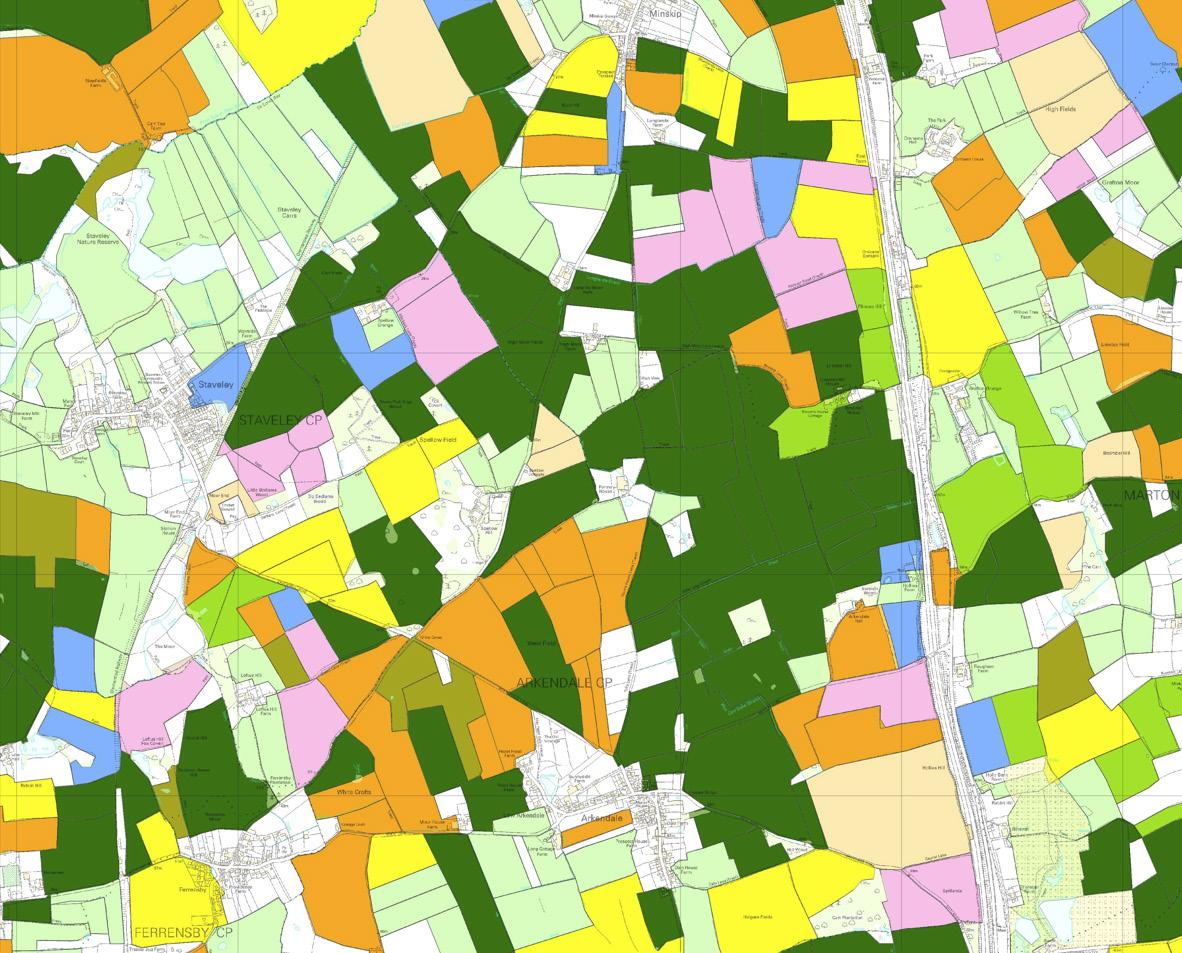
Future planning.

Looking ahead, UKCEH will continue to work with farmers to define clear, scalable pathways to “net zero plus” agriculture. This means not only reducing emissions but enhancing nature and long-term farm viability. Farmers are encouraged to explore tools such as E-Planner and Soil Fundamentals, and to participate in projects like AgZero+ to trial innovative methods and gain access to cutting-edge research. Data-led collaboration is key to building resilient food systems for future generations.

